BUSINESS STRATEGIES

How to create a consultant business plan
- Nirit Braun
- Oct 30, 2023
- 12 min read

When launching your consulting business, one of the essential first steps is crafting a well-structured and detailed business plan. Your consulting business plan is like a strategic playbook that lays out your goals, tactics and financial projections. It not only steers you toward success but also equips you to adapt and thrive in the dynamic world of consulting.
Keep reading for tips on how to build a strong business plan for your business. Use the template provided at the end to get started on your own plan.
Looking to kick off your consultancy business? Create a business website today with Wix.
Why create a consultant business plan? Top benefits to consider
A business plan forces entrepreneurs to thoroughly evaluate their business idea, target audience and competitive landscape. This process clarifies their vision and mission, ensuring that they have a clear understanding of how their consultancy will provide value to clients. A business plan helps you in the following ways:
Create a business blueprint : With a business plan in place, entrepreneurs looking to start a business can make informed decisions based on a solid foundation of research and analysis. They can choose the most effective strategies for marketing, pricing and service delivery, enhancing their chances of success. Your business plan can also be used to explain what type of business you'll start - whether that's an LLC, Corporation or something else. Learn more about how to start an LLC .
Secure funding : The cost to start a consultancy business can range from around $60 to several thousand dollars . For those seeking external funding, a well-developed business plan demonstrates credibility and professionalism. Investors and lenders are more likely to support a venture with a thought-out plan that showcases its potential for growth and profitability.
Set measurable goals : A business plan sets measurable goals and performance metrics, which is vital with this type of business . This allows entrepreneurs to track their progress, adapt strategies as needed and celebrate milestones along the way.
Want to remind yourself of the basics? Learn more about how to start a service business .
How to create a successful consultant business plan in 6 steps
In this section, we'll break down the key components involved in crafting a successful consultant business plan in six steps.
Executive summary
Business and domain names
Market analysis and research
Operations plan
Marketing and advertising plan
Financial plan
01. Executive summary
An executive summary serves as a concise overview of the consultant's business plan, providing a snapshot of the key components and the business' essence. It's usually the first section investors, lenders and stakeholders read, so it must encapsulate the business' value proposition, objectives, strategies and projected growth. To write a clear executive summary for a consultant business make sure to keep it succinct yet informative. Clearly state the purpose of the business, the services offered, the target market and the unique value proposition. Avoid technical jargon that may confuse readers.
Then you can mention the business' strengths, such as the expertise of the consultants, unique methodologies or specialized services. Emphasize factors that set your consultancy apart from competitors.
Briefly discuss the market need for your services and how your consultancy plans to fulfill it. It’s worth noting that strategy and management consulting, as well as technology consulting, financial consulting and HR consulting are in high demand . Highlight any trends or changes in the industry that your business can capitalize on.
Remember to include a snapshot of your financial projections, indicating expected revenue, costs and profitability. This provides a glimpse into the business' potential financial success.
Example of an executive summary for a consultant business
"XYZ Consulting is a boutique consultancy firm specializing in digital transformation for small and medium-sized enterprises (SMEs). With a team of seasoned professionals, we offer tailored solutions to help businesses harness the power of technology for growth. Our unique approach blends strategic consulting with hands-on implementation, ensuring tangible results. In a rapidly evolving tech landscape, XYZ Consulting is poised to be the partner SMEs need to thrive. Our financial projections forecast a steady growth trajectory, with a focus on achieving profitability within the first two years. With a proven track record and a finger on the pulse of industry trends, XYZ Consulting is well-equipped to guide businesses toward digital success."
02. Business and domain names
Knowing how to name a business is crucial for a consultancy venture and a key step before you register your business . It's the foundation of your brand and influences how clients perceive your services. With Wix , you can use a free business name generator or consulting company name generator as helpful tools for brainstorming unique and memorable names. Ensure the name reflects your expertise and the services you offer.
Similarly, the domain name for your business website is vital. It should be easy to remember, relevant to your services and ideally, match your company name. Check the domain's availability using domain registration platforms. Ensure the domain name aligns with your consultancy's focus and services. Generally, this means keeping it short and easy to spell and pronounce.
Learn more: How to make a consulting website
03. Market analysis and research
Incorporating a thorough market analysis within your consultant business plan is essential. Understand the competitive landscape, target audience and market trends. Research your competitors' strengths and weaknesses, pricing strategies and client base. This information will shape your business strategies and help you identify gaps in the market that your consultancy can fill.
04. Operations plan
The operations plan outlines the logistical aspects of your consultancy. It covers location, premises, equipment and staffing requirements. Determine whether your consultancy will be home-based, have a physical office or operate virtually. Define the equipment and software needed to deliver services effectively. Outline your staffing needs, including the roles and expertise required.
05. Marketing and advertising plan
Your marketing and advertising plan outlines how you will promote your consultant business. Identify the most effective strategies to reach your target audience. Consider content marketing, social media campaigns, networking events and speaking engagements to showcase your expertise. Emphasize how your marketing efforts will build brand awareness and attract clients.
You’ll need to develop a suite of brand assets to use in your marketing as well, starting with a company logo. You can use a free logo maker to get a professional logo in minutes.
06. Financial plan
The financial plan is a critical component of any business plan. It outlines how you will raise money for your business initially and provides a timeline for reaching profitability. Detail your startup costs, including equipment, marketing expenses and personnel. Present your revenue projections, taking into account different pricing models and growth scenarios. Highlight your break-even point and the strategies you'll employ to achieve profitability.
By addressing each part of their plan, entrepreneurs can create a robust business plan that guides them toward achieving their business goals and building a reputable consulting brand.

Consultant business plan examples
These templates illustrate two hypothetical consultant business plans, each tailored to a specific niche. These are just templates and should be adapted to your specific business goals and industry dynamics.
Consultant business plan template 1: XYZ Digital Consultants
XYZ Digital Consultants is a pioneering consultancy firm focused on digital transformation for businesses seeking to thrive in the digital age. Our team of experienced professionals offers strategic guidance and hands-on implementation to drive growth through technology adoption. With projected profitability within two years and a commitment to excellence, XYZ Digital Consultants is poised to lead businesses into a successful digital future.
Company and domain name
Company name: XYZ Digital Consultants
Domain name: xyzdigitalconsultants.com
Market opportunity: The rapid shift toward digital operations has created a substantial demand for expert guidance. Our analysis reveals a gap in the market for holistic digital transformation solutions tailored to the needs of SMEs.
Competitor research: We've identified key competitors and their strengths, which informs our strategy to emphasize personalized service and comprehensive implementation.
Location: Primarily virtual, with occasional in-person consultations as needed.
Premises: Home-based setup with access to modern communication tools.
Equipment: High-speed internet, latest software tools and virtual meeting platforms.
Staffing: Founder and lead consultant, supported by contract specialists as projects demand.
Content marketing: Regular blog posts on digital transformation trends, case studies and client success stories.
Social media campaigns: Active presence on LinkedIn and X to engage with potential clients and share valuable insights.
Networking events: Participation in industry webinars, seminars and local business events to showcase expertise.
Speaking engagements: Leveraging speaking opportunities at conferences and workshops to establish authority in the field.
Startup costs (equipment, website development, marketing materials): $15,000
Revenue projections (year one): $150,000
Revenue projections (year two) : $300,000
Break-even point: Achieved by the end of year one
Funding: Initial investment and savings from the founder
Consultant business plan template 2: LeadersEdge Consultants
LeadersEdge Consultants is a dynamic consultancy dedicated to leadership development and organizational excellence. Our experienced team offers customized programs that empower leaders to drive positive change. With a projected growth trajectory and a commitment to fostering impactful leadership, LeadersEdge Consultants is poised to transform organizations and elevate their success.
Company name: LeadersEdge Consultants
Domain name: leadersedgeconsultants.com
Market opportunity: Our analysis reveals a growing need for leadership development programs in diverse industries.
Competitor research: We've identified competitors' offerings and recognized an opportunity to provide a unique blend of coaching, training and strategy implementation.
Location: Virtual consultations, with the option for on-site workshops
Premises: Virtual office setup with video conferencing capabilities
Equipment: High-quality audiovisual tools, assessment software and learning platforms
Staffing : Founder will serve as the lead consultant, supported by certified leadership coaches
Customized workshops: Designing tailored leadership development programs for individual organizations.
Webinars: Hosting webinars on leadership best practices to showcase expertise and engage potential clients.
Thought leadership content: Publishing whitepapers, eBooks and video content on leadership topics.
Collaborations: Partnering with HR and talent development professionals to expand reach.
Startup costs ( making a website , training materials) : $10,000
Revenue projections (year one): $120,000
Revenue projections (year two): $250,000
Break-even point: Achieved within the first six months
Funding: Initial investment from the founder.
How much should you be charging as a consultant?
The amount you charge as a consultant will depend on a number of factors, including:
Your experience and expertise
The type of consulting services you offer
The value you provide to your clients
The market rate for consulting services in your field
In general, consultants charge between $100 and $500 per hour. However, some experienced and highly specialized consultants can charge upwards of $1,000 per hour.
To determine your consulting rate, you can use the following formula:
Consulting rate = Hourly rate * Value multiplier
Your hourly rate should reflect your experience and expertise, as well as the type of consulting services you offer. For example, if you have 10 years of experience and you offer specialized consulting services, you can charge a higher hourly rate than a consultant with less experience and who offers more general consulting services.
Your value multiplier should reflect the value you provide to your clients. For example, if you can help your clients to achieve significant results, you can charge a higher value multiplier.
Here is an example of how to use the formula:
Consultant: Experienced consultant with 10 years of experience offering specialized consulting services
Hourly rate: $200 per hour
Value multiplier: 2
Consulting rate: $200 per hour * 2 = $400 per hour
Can a consulting business be profitable?
Yes, a consulting business can be profitable. In fact, consulting is one of the most profitable industries in the world. According to a report by IBISWorld, the average profit margin for consulting businesses is 20%. This means that for every $100 in revenue, consulting businesses generate $20 in profit.
There are a number of factors that contribute to the profitability of consulting businesses. First, consultants are able to charge high fees for their services. Second, consulting businesses have relatively low overhead costs. Third, the demand for consulting services is high, and it's only expected to grow in the coming years.
Of course, not all consulting businesses are successful. Some consultants struggle to find clients or to charge high enough fees. Others may not be able to deliver the results that their clients expect. However, for consultants who are able to overcome these challenges, the potential rewards are great.
Here are some tips for increasing your chances of success as a consultant:
Specialize in a high-demand area of consulting. This will allow you to charge higher fees and attract more clients.
Build a strong reputation and network of clients. This will help you to generate word-of-mouth referrals and land new clients.
Market your services effectively. Make sure that potential clients know about your services and how you can help them.
Deliver high-quality results. This is the most important thing you can do to ensure that your clients are satisfied and that they continue to use your services in the future.
How much does it cost to start a consulting business?
The cost to start a consulting business can vary depending on a number of factors, such as the type of consulting services you offer, the size of your business and your location. However, in general, you can expect to spend between $10,000 and $50,000 to start a consulting business.
Here is a breakdown of some of the typical start-up costs for a consulting business:
Business formation: $100 to $1,000
Website and domain name: $100 to $2,500
Marketing and advertising: $500 to $5,000
Office equipment and supplies: $500 to $5,000
Professional liability insurance: $500 to $1,000
Other miscellaneous expenses: $500 to $5,000
Total start-up costs: $10,000 to $50,000
You can reduce your start-up costs by working from home, using free or low-cost marketing tools and purchasing used equipment. You can also start your consulting business part-time while you continue to work your full-time job. This will give you a chance to generate revenue and build a client base before you leave your full-time job.
If you need financial assistance to start your consulting business, you may be able to qualify for a loan from a bank or credit union. You may also be able to find investors who are willing to invest in your business.
Which clients to avoid and which to take on?
Here are some tips on which clients to avoid and which to take on in a consulting business:
Clients to avoid
Clients who aren't willing to pay your rates. If a client isn't willing to pay your rates, it's a sign that they don't value your services.
Clients who are unrealistic about their expectations. If a client has unrealistic expectations about what you can achieve, you're likely to set yourself up for failure.
Clients who are difficult to work with. If a client is demanding, rude or disrespectful, it's best to avoid them.
Clients who aren't a good fit for your business. If a client isn't in your target market or if their business isn't aligned with your values, it's best to decline working with them.
Clients to take on
Clients who are willing to pay your rates. This shows that they value your services and are committed to working with you.
Clients who have realistic expectations. This makes it more likely that you will be able to meet their needs and exceed their expectations.
Clients who are easy to work with. This will make the consulting process more enjoyable and productive for both of you.
Clients who are a good fit for your business. This means that they're in your target market and that their business is aligned with your values.
In addition to the above, here are some other factors to consider when deciding which clients to take on:
Your own skills and experience. Make sure that you have the skills and experience to help the client achieve their goals.
The client's budget. Make sure that the client has a budget that's sufficient to cover your fees.
The client's timeline. Make sure that you have the time and resources to meet the client's timeline.
Your gut feeling. If you have a bad feeling about a client, it's best to trust your gut and decline working with them.
It's important to be selective about the clients you take on. By avoiding difficult clients and focusing on good-fit clients, you can set yourself up for success in your consulting business.
Consultant business plan FAQ
What qualifies you as a consultant.
To qualify as a consultant, you need to have the expertise and experience in the area that you're consulting in. You also need to be able to communicate your ideas effectively and build relationships with clients.
How do you start off as a consultant?
How to make 6 figures as a consultant, how do you pay yourself as a consultant, do consultants pay their own taxes, want to create another business plan.
How to create a virtual assistant business plan
How to create a cleaning business plan
How to create an eCommerce business plan
How to create a plumbing business plan
How to create a trucking business plan
How to create a daycare business plan
How to create a food truck business plan
How to create a restaurant business plan
How to create a clothing line business plan
How to create a real estate business plan
How to create a contractor business plan
How to create a bar business plan
How to create a coffee shop business plan
How to create a bakery business plan
Looking for other service business ideas ?
How to start an online business
How to start a consulting business
How to start a fitness business
How to start a fitness clothing line
How to start a makeup line
How to start a candle business
How to start a clothing business
How to start an online boutique
How to start a T-shirt business
How to start a jewelry business
How to start a subscription box business
How to start a beauty business
How to start a car wash business
How to start a baking business
How to start a food prep business
How to start a trucking business
How to start a construction business
How to start a landscaping business
How to start a food business
How to start a vending machine business
How to start a contractor business
How to start a coaching business
How to start an eCommerce business
How to start a dropshipping business
How to start a farming business
How to start a plumbing business
How to start a rental property business
How to start a cleaning business
Check out more service business examples .
Looking to start a business in a specific state?
How to start a business in Arizona
How to start a business in South Carolina
How to start a business in Virginia
How to start a business in Michigan
How to start a business in California
How to start a business in Florida
How to start a business in Texas
How to start a business in Wisconsin
Related Posts
How to create a website from scratch in 11 steps (for beginners)
How to start a business in 14 steps: a guide for 2024
Consulting business names for your firm
Was this article helpful?

How To Write A Consulting Business Plan
Creating a business plan is essential for any business, but it can be especially helpful for consultants who want to establish their credibility and get ahead in the industry.
A well-crafted business plan not only outlines your vision for the company but also provides a step-by-step process of how you are going to accomplish it. In order to create an effective business plan, you must first understand the components that are essential to its success.
This article will provide an overview of the key elements that every consultant should include in their business plan.
Download the Ultimate Consulting Business Plan Template
What is a Consulting Business Plan?
A consulting business plan is a formal written document that describes your company’s business strategy and its feasibility. It documents the reasons why you will be profitable, how you can succeed in your market, what will set your product or service apart from others, and includes information about your team members, if applicable, to convince investors and lenders (if needed) that you have what it takes to make your venture successful.
Why Write a Consulting Business Plan?
A consulting business plan is required for banks and loan companies, and it is often requested by investors. This document is a clear and concise guide of your business idea and the steps you will take to make it profitable.
Entrepreneurs can also use this as a roadmap when starting their new company or venture, especially if they are inexperienced in starting a business.
Writing an Effective Consulting Business Plan
The following are the key components of a successful consulting business plan:
Executive Summary
The executive summary of a consulting business plan is a one to two page overview of your entire business plan. It should summarize the main points, which will be presented in full in the rest of your business plan.
- Start with a one-line description of your consulting firm
- Provide a short summary of the key points of each section of your business plan.
- Organize your thoughts in a logical sequence that is easy for the reader to follow.
- Include information about your company’s management team, industry analysis, competitive analysis, and financial forecast.
Company Description
This section should include a brief history of your company. Include a short description of how it all started, and provide a timeline of milestones the company has achieved.
If you are just starting your consulting business, you may not have a long company history. Instead, you can include information about your professional experience in this industry and how and why you conceived your new venture. If you have worked for a similar company before or have been involved in an entrepreneurial venture before starting your consulting firm, mention this.
Industry Analysis
The industry or market analysis is an important component of a consulting business plan. Conduct thorough market research to determine industry trends, identify your potential customers, and the potential size of this market.
Questions to answer include:
- What part of the consulting industry are you targeting?
- Who are your competitors?
- How big is the market?
- What trends are happening in the industry right now?
You should also include information about your research methodology and sources of information, including company reports and expert opinions.
Customer Analysis
This section should include a list of your target audience(s) with demographic and psychographic profiles (e.g., age, gender, income level, profession, job titles, interests). You will need to provide a profile of each customer segment separately, including their needs and wants.
You can include information about how your customers make the decision to buy from you as well as what keeps them buying from you.
Develop a strategy for targeting those customers who are most likely to buy from you, as well as those that might be influenced to buy your products or consulting services with the right marketing.
Competitive Analysis
The competitive analysis helps you determine how your product or service will be different from competitors, and what you are using as your unique selling proposition (USP) that will set you apart in this industry.
Complete a SWOT Analysis. Your SWOT analysis should include:
- Strengths : what are your strengths?
- Weaknesses : what are your weaknesses?
- Opportunities : how can you take advantage of competitive weaknesses and strike back at them with your strengths and possible new product or service offerings?
- Threats : what are the potential threats to your company? How can you prepare for them? What can you do to mitigate potential risks?
You will then use this information to develop your own competitive strategy. Determine your competitive advantage and how you will differentiate your business from these competitors.
Marketing Plan
Your consulting marketing plan is where you determine how you are going to reach your target customer(s). Your marketing strategy should be clearly laid out, including the following 4 Ps.
- Product/Service : Make sure your service offering is clearly defined and differentiated from your competitors, including the benefits of using your service.
- Price : How do you determine the price for your service? You should also include a price strategy that takes into account what customers will be willing to pay and how much the competition within your market charges.
- Place : Where will your customers find you? What channels of distribution will you use to reach them?
- Promotion : How will you reach your target market? You can use social media or write a blog, create an email marketing campaign, post flyers, pay for advertising, launch a direct mail campaign, etc.
You should also include information about your paid advertising budget, including an estimate of expenses and sales projections.
Operations Plan
The operations plan should include the following information:
- How will you deliver your service to customers? For example, will you do it in person or over the phone only?
- What infrastructure, equipment, and resources are needed to operate successfully? How can you meet those requirements within budget constraints?
The operations plan is where you also need to include your company’s business policies. You will want to establish policies related to everything from customer service to pricing, to the overall brand image you are trying to present.
Management Team
Include a list of team members including names and titles, as well as their expertise and experience relevant to your specific consulting industry. Include brief biography sketches for each team member.
Financial Plan
Now include a complete and detailed financial plan. This is where you will need to break down your expenses and revenue projections for the first 5 years of operation. This includes the following financial statements:
Income Statement
Your income statement should include:
- Revenue : how will you generate revenue?
- Cost of Goods Sold : These are your direct costs associated with generating revenue. This includes labor costs, as well as the cost of any equipment and supplies used to deliver the service offering.
- Net Income (or loss) : once expenses and revenue are totaled and deducted from each other, what is the net income or loss?
Sample Income Statement for a Startup Consulting Firm
Balance sheet.
Include a balance sheet that shows what you have in terms of assets, liabilities, and equity. Your balance sheet should include:
- Assets : All of the things you own (including cash).
- Liabilities : This is what you owe against your company’s assets, such as accounts payable or loans.
- Equity : The worth of your business after all liabilities and assets are totaled and deducted from each other.
Sample Balance Sheet for a Startup Consulting Firm
Cash flow statement.
Include a cash flow statement showing how much cash comes in, how much cash goes out and a net cash flow for each year. The cash flow statement should include:
- Income : all of the revenue coming in from clients.
- Expenses : all of your monthly bills and expenses. Include operating, marketing and capital expenditures.
- Net Cash Flow : the difference between income and expenses for each month after they are totaled and deducted from each other. This number is the net cash flow for each month.
Using your total income and expenses, you can project an annual cash flow statement. Below is a sample of a projected cash flow statement for a startup consulting business.
Sample Cash Flow Statement for a Startup Consulting Firm
You will also want to include an appendix section which may include:
- Your complete financial projections
- A complete list of your company’s business policies and procedures related to the rest of the business plan (marketing, operations, etc.)
- A list of your hard assets and equipment with purchase dates, prices paid and any other relevant information
- A list of your soft assets with purchase dates, prices paid and any other relevant information
- Biographies of the key employees listed in the executive summary section above.
- References to people you have done business with who are willing to confirm their positive business holdings with your company.
Writing a good business plan gives you the advantage of being fully prepared to launch and grow your consulting company. It not only outlines your business vision but also provides a step by step process of how you are going to accomplish it. Sometimes it may be difficult to get started, but once you get the hang of it, writing a business plan becomes easier and will give you a sense of direction and clarity about your consulting company.
Finish Your Consulting Business Plan in 1 Day!
Wish there was a faster, easier way to finish your consulting business plan?
With our Ultimate Consulting Business Plan Template you can finish your plan in just 8 hours or less!
How to write a consulting business plan
If you want to work as a consultant, you'll need a plan. Here's how to create one just for you.

Consultants do things differently
If you’re a self-employed consultant your work isn't like other forms of business. Unlike retailers or manufacturers, you're not making and/or selling tangible products. And unlike service companies, you're not employing a team of people to provide solutions.
Remember you’re not not just selling your time. As a consultant, you will be paid for the skills, knowledge and abilities you've developed over your career.
We have some useful background reading about the benefits of becoming a consultant or contractor , which will help explain how such businesses work. But having decided to become a consultant, what's the next step?
Like all new small businesses, you'll need a plan. That plan will have to cover funding, growth, pay rates, expenses, marketing, equipment costs, training and qualifications. It will also have to cover your goals, and the strategy you'll use to reach them.
Consulting business plans are a little different to other business plans. Here's what you need to know to get your consulting career off the ground.
Who are you writing the plan for?
This is an important question to ask yourself before you start. For most conventional businesses the answer will be "For the bank and investors." That's because small businesses usually need startup funding to get off the ground.
But consultants setting up their own business might not need much funding – if any. It's still important to have a business plan though – not only to clarify the details in your own mind, but also to help you understand the potential risks and rewards.
A good business plan will combine elements of both finance and strategy, but the contents will vary depending on the target audience. We'll take a look at the options next.
A business plan for banks and investors
You may not need funding for capital equipment expenses or office rent. But you might need a loan to tide you over for the first few months, until you have a regular cash flow. The initial period for any new business can be a tough time – money worries will just make it tougher.
You may also decide that you want to make more of an impression by hiring office space, perhaps in a shared office environment. Or you might want funds to spend on marketing and advertising, particularly if you're offering consulting services in a competitive market.
For all of this, you'll need money. You could apply for a bank loan, look for grants, or try other forms of capital-raising such as crowdfunding. Whichever method you choose, any potential investors will want to see the important numbers. That means you'll need to cover the following points in your business plan:
- target market and sector analysis
- business objectives and USP (unique selling proposition)
- startup expenses and assets, including equipment
- overheads and fixed costs
- marketing strategy and budget
- funding requirements, loan collateral and cost of interest
- pay rates, revenue and cash flow projections
- sales forecasts in monthly intervals
- ongoing expenses
- growth projections and strategy
Some of this information will be difficult for you to estimate. It might be even harder for you to present clearly. Use your accounting software to help with figures and to produce professional tables and charts. Then, an accountant can help you include the right information in your plan.
A business plan for you
Of course, you might not need any funding. Perhaps you have enough savings to keep you going for a few months and clients already lined up. Or you may be starting your consulting career after an inheritance or unexpected windfall.
If money isn't an immediate concern, you can afford to be less formal when drafting your plan. That means making sensible predictions and setting goals for yourself, not just financial targets – though you should include those too.
This isn't an exercise in creative writing. The purpose of creating a plan is to help you concentrate on what you want to achieve. Some points to consider include:
Reasons for being a consultant
Why are you doing this? It's important to answer honestly. If the answer is “to make more money” or “because I'm good at what I do” then write that down. Write down all the reasons you can think of, then read them back. Do they sound convincing? Make sure you know your true motivation, as it will help you focus on your goals.
Consulting can mean you have an irregular income. Sometimes you might be busy, other times less so. It makes sense to keep some money in savings accounts, especially if you'll be paying tax at the end of the year instead of while you're earning.
Relationship risks
Think about the impact of consulting on your family or friends. Consultants often work irregular hours, sometimes from home, and they might be working at weekends. That can put a strain on relationships. Be realistic about this and set boundaries around when and where you will work.
Which clients to avoid and which to take on
You will already have an idea of the types of client you don't want to work for, because you know the industry you work in. For example, known late-payers can damage your cash flow so it's sensible to avoid them where possible. Look for clients who are reliable, as they’ll help make your business a success. Know that you can let go of clients who are more trouble than they're worth.
Training and certification
In many industries, especially IT, it's important to keep your skills up to date. But your clients are unlikely to pay for you to go on training courses – that's an expense you'll have to cover yourself. How will you stay up to date? Think about industry magazines, websites, forums, news feeds, conferences, courses, distance learning, peer groups and self-teaching strategies.
Personal goals
Perhaps you're planning to be a consultant for the rest of your working life. Maybe you want to do it for a couple of years and then move back in-house as an employee. Or you might want to start employing other consultants at some stage and build up an agency – maybe even sell it. It doesn't matter what your personal goals are, as long as you have some. Write them down and bear them in mind when making big decisions.
What to do with your profits
This is a good opportunity to think about how much money you want to make . Consider how much you will charge and what you will do with your commission. For example you may decide to use 50% to cover costs, pay yourself with 30% and put 20% back into your business.
Some of this information would be inappropriate to include in a financial business plan for banks or investors. But it can be very helpful in guiding you through the early part of your consulting career.
Five top tips for writing a good consulting business plan
Business plans can be difficult documents to write. If you've never done it before, thinking clearly and logically about your business strategy may not be easy. Here are some tips to help you succeed:
1. Write the first draft
Don't worry about grammar, structure or neatness. Just get the thoughts out of your head and onto the paper or screen. Some people find this easier to do in an informal setting, such as a library or café.
2. Do your research
Understand the market you're going to be working in. Get to know all the details, as it'll help you write a more effective consulting business plan.
3. Identify your USP
That's your unique selling proposition. Why should companies hire you and not one of your competitors? Think carefully about what you're particularly good at, then use that as a basis for marketing yourself.
4. Get feedback
Talk to your peers, friends, previous business associates and potential customers. Show them your plan and listen to their feedback.
5. Keep it simple
Don't write dozens of pages. You'll bore the investors and your plan will end up on a pile where nobody will ever look at it again – including you. Stick to the important points.
Update your business plan regularly
A business plan isn't a static document. It should change and evolve over time as your business grows. You will learn a great deal in your first few months working as a consultant, and that knowledge should be applied to your business plan. It's a good idea to review your plan every month.
You may find that some of what you initially wrote turns out to have been misguided, inaccurate or just plain wrong. That's normal. Nobody can predict every step a business will take. The important thing is to learn as you go along – and make use of that knowledge to improve your plan.
Plan for consulting success
A consulting business plan is written as much for you, the consultant, as for anyone else. The point of writing it is to concentrate on what's important. That clarity is what will help you succeed.
So don't look at a business plan as just another box to be ticked. It's a fundamental process when starting any business, particularly a consulting business where you will need initiative and drive to succeed.
Take the time to write a proper business plan, and keep it regularly updated as your business grows. You can use our free business plan template . You'll find it an invaluable guide to becoming a successful consultant.
Xero does not provide accounting, tax, business or legal advice. This guide has been provided for information purposes only. You should consult your own professional advisors for advice directly relating to your business or before taking action in relation to any of the content provided.
Download the business plan template
Fill in the form to get a free business plan template as an editable PDF. We’ll send a one-pager and a multi-pager to choose from.
Privacy notice .
Start using Xero for free
Access Xero features for 30 days, then decide which plan best suits your business.
- Included Safe and secure
- Included Cancel any time
- Included 24/7 online support
Or compare all plans
Consulting Firm Business Plan Guide
Starting your own business, or scaling up is intimidating. we’re here to break it down piece by piece so you can create your very own plan., in this free , you will learn:.
- Why Create a Consulting Firm Business Plan?
- The Key Components of a Business Plan
- How to Use a Business Model Canvas
- How to Bake Productization Into Your Business Plan

You’re in the right place if…
○ You have an idea for a consulting firm, and you’re ready to take the next step ○ You’ve started a business, and you need focus and direction
○ Your consulting company needs to bring in partners or funding
Starting a consulting business is no small task, so setting a clear action plan is essential. This comprehensive guide will give you a step-by-step breakdown of how to create a consulting business plan, why you need one, and how a business model canvas can help you along the way.
Try Thinkific for yourself!
Accomplish your course creation and student success goals faster with thinkific..
Download this guide and start building your online program!
It is on its way to your inbox
Consulting Firm Business Plan Template
Written by Dave Lavinsky
Business Plan Outline
- Consulting Firm Business Plan Home
- 1. Executive Summary
- 2. Company Overview
- 3. Industry Analysis
- 4. Customer Analysis
- 5. Competitive Analysis
- 6. Marketing Plan
- 7. Operations Plan
- 8. Management Team
- 9. Financial Plan
Start Your Consulting Firm Plan Here
Consulting Business Plan
If you need a business plan for your consulting business, you’ve come to the right place. Our consulting business plan template below has been used by countless entrepreneurs and business owners to create business plans to start or grow their consulting businesses.
Important note: If you are looking for a business plan consultant , specifically, a consultant to help you write your business plan, we recommend Growthink who offers a business plan consultation service here.
Sample Consultant Business Plan & Template
Below are links to each section of your consulting business plan template:
- Executive Summary
- Company Overview
- Industry Analysis
- Customer Analysis
- Competitive Analysis
- Marketing Plan
- Operations Plan
- Management Team
- Financial Plan
Next Section: Executive Summary >
Consulting Business Plan FAQs
What is a consulting business plan.
A consulting business plan is a plan to start and/or grow your consulting firm. Among other things, it outlines your business concept, identifies your target customers, presents your marketing plan, and details your financial projections.
You can easily complete your consulting firm business plan using our Consulting Firm Business Plan Template here .
What Are the Main Types of Consulting Firms?
There are many types of consulting firms. Most consultant companies are in business concentrations such as Management, Strategy, Operations, IT, Human Resources, Financial Advisory, and Marketing/Sales. There are also firms that are singularly focused such as those that offer business plan consulting.
What Are the Main Sources of Revenue and Expenses for a Consulting Business?
The primary source of revenue for consulting firms are fees paid by the client. The client will either sign a contract or agreement of the services it will choose and the pricing for those services beforehand.
The key expenses for a consulting business are the cost of leasing the office, employee cost, marketing/advertising costs, and any office technology or software.
How Do You Get Funding for Your Consulting Business?
Consulting businesses are most likely to receive funding from banks. Typically you will find a local bank and present your consulting business plan to them. Angel investors and other types of capital-raising such as crowdfunding are other common funding sources.
What are the Steps To Start a Consulting Business?
Starting a consulting business can be an exciting endeavor. Having a clear roadmap of the steps to start a business will help you stay focused on your goals and get started faster.
1. Develop A Consulting Business Plan - The first step in starting a business is to create a detailed consulting business plan that outlines all aspects of the venture. This should include potential market size and target customers, the services or products you will offer, pricing strategies and a detailed financial forecast.
2. Choose Your Legal Structure - It's important to select an appropriate legal entity for your consulting business. This could be a limited liability company (LLC), corporation, partnership, or sole proprietorship. Each type has its own benefits and drawbacks so it’s important to do research and choose wisely so that your consulting business is in compliance with local laws.
3. Register Your Consulting Business - Once you have chosen a legal structure, the next step is to register your consulting business with the government or state where you’re operating from. This includes obtaining licenses and permits as required by federal, state, and local laws.
4. Identify Financing Options - It’s likely that you’ll need some capital to start your consulting business, so take some time to identify what financing options are available such as bank loans, investor funding, grants, or crowdfunding platforms.
5. Choose a Location - Whether you plan on operating out of a physical location or not, you should always have an idea of where you’ll be based should it become necessary in the future as well as what kind of space would be suitable for your operations.
6. Hire Employees - There are several ways to find qualified employees including job boards like LinkedIn or Indeed as well as hiring agencies if needed – depending on what type of employees you need it might also be more effective to reach out directly through networking events.
7. Acquire Necessary Consulting Equipment & Supplies - In order to start your consulting business, you'll need to purchase all of the necessary equipment and supplies to run a successful operation.
8. Market & Promote Your Business - Once you have all the necessary pieces in place, it’s time to start promoting and marketing your consulting business. This includes creating a website, utilizing social media platforms like Facebook or Twitter, and having an effective Search Engine Optimization (SEO) strategy. You should also consider traditional marketing techniques such as radio or print advertising.
Learn more about how to start a successful consulting business:
- How to Start a Consulting Business
Where Can I Get a Consulting Business Plan PDF?
You can download our free consulting business plan template PDF here . This is a sample consulting business plan template you can use in PDF format.
Upmetrics AI Assistant: Simplifying Business Planning through AI-Powered Insights. Learn How
- AI ASSISTANTS
Upmetrics AI Your go-to AI-powered business assistant
AI Writing Assist Write, translate, and refine your text with AI
AI Financial Assist Automated forecasts and AI recommendations
- TOP FEATURES
AI Business Plan Generator Create business plans faster with AI
Financial Forecasting Make accurate financial forecasts faster
Strategic Planning Develop actionable strategic plans on-the-go
AI Pitch Deck Generator Use AI to generate your investor deck
See how it works →
AI-powered business planning software
Very useful business plan software connected to AI. Saved a lot of time, money and energy. Their team is highly skilled and always here to help.
- Julien López
- BY USE CASE
Starting & Launching a Business Plan your business for launch and success
Validate Your Business Idea Discover the potential of your business idea
Secure Funding, Loans, Grants Create plans that get you funded
Business Consultant & Advisors Plan with your team members and clients
Business Schools & Educators Simplify business plan education for students
Students & Learners Your e-tutor for business planning
- Sample Plans
- WHY UPMETRICS?
Reviews See why customers love Upmetrics
Customer Success Stories Read our customer success stories
Blogs Latest business planning tips and strategies
Strategic Planning Templates Ready-to-use strategic plan templates
Business Plan Course A step-by-step business planning course
Ebooks & Guides A free resource hub on business planning
Business Tools Free business tools to help you grow
- Sample Business Plans
How to Write a Consulting Business Plan + Free Template

Are you someone people usually come to to get valuable business advice? Or do you really like sharing valuable business insights to help businesses grow? Well, starting a consultancy business can be one efficient move to monetize your expert skills.
Now, you wouldn’t start a business without solid planning, would you? Well, how about you take the first step and write an actionable management consulting business plan for your business idea?
Writing a business plan can be tough. But we are here to make it easier for you.
This step-by-step guide is here to help you write a forward-thinking, realistic plan in easy actionable ways and offers a free management consulting business plan template to kickstart your writing process. .
So let’s get started.
Key Takeaways
- Craft a remarkable executive summary summarizing the concept, strategies, objectives, financial projections, and mission values of your consulting business plan.
- Conduct in-depth industry analysis and market research identifying emerging trends and shifts that are likely to influence your consultancy business.
- Introduce the services of your consultancy firm along with its pricing plan to give readers a thorough idea of your service offerings.
- Conduct a SWOT analysis of your key competitors and determine your competitive edge over them to strengthen your competitive analysis.
- Lay down a clear organizational chart highlighting the key skills, salaries, and experience of people working in your consulting firm. .
- Create realistic financial projections for sales, revenue, costs, expenses, and cash flow for your consultancy after making room for contingencies and emergencies.
- Draft a detailed operations plan highlighting the processes and procedures for everyday activities at your consultancy.
- Devise a diversified marketing and sales plan to promote your business effectively to your target audience.
Key Elements of a Management Consulting Business Plan
- Executive Summary
- Company Overview
- Competitor and Market Analysis
- Service Offerings
- Marketing Plan
- Management Consulting Team
- Operational Plan
- Financial Outlook
Since we are talking about a consulting business plan, let us walk you through this step-by-step outline to help you write a stellar plan covering all the essential facets.
1. Executive Summary
The executive summary is the first and foremost section of your consulting business plan that will engage your readers and persuade them to dive further into details.
Begin by offering a brief overview of your business idea highlighting what it does. Take reference from the below example written using Upmetrics AI assistant .
Further, paint a picture, briefly highlighting your consulting services, market scenario, competition, USP, marketing and sales strategies, and financial objectives.
Ensure that you adopt a storytelling approach while crafting your executive summary. Ideally, this section of your business plan should concisely summarize your entire business plan in a page or two.
So ensure that you strategically place the information within this section to keep the readers hooked.
Now be smart and revisit this section after you are done writing for every other section of your plan. A thorough understanding of your business plan at that time will enable you to craft a compelling summary easily.
Say goodbye to boring templates
Build your business plan faster and easier with AI
Plans starting from $7/month

2. Company Overview
This section of a business plan helps the reader get a thorough understanding of your consulting firm.
The company overview offers a detailed description highlighting what type of consultancy you would run, its physical location, legal structure, mission objectives, history, and all such related information.
Begin by clearly stating the concept and niche of your consulting firm. Further, highlight whether you would be running a sole proprietorship or partnership, and if it’s the latter discuss the profit-sharing ratio.
Don’t forget to mention your business structure and whether or not will you run a Limited Liability Company (LLC).
This section is your chance to introduce your business objectives, core value proposition, and mission objectives. Highlight any milestones you plan to achieve or have already achieved and make this section insightful.
Refer to this example describing the short-term objectives of a consulting firm from an Upmetrics plan.

3. Competitor and Market Analysis
An in-depth analysis of the consulting industry, market, and competitors is essential to build a successful consulting business. This is the most crucial part of your consultancy business plan helping you identify your target market, emerging trends, competitors, and your advantage over them.
Market analysis
The market analysis section of your consultant business plan will help you evaluate the market condition, target market, and business growth opportunities for your consultancy business.
Begin by researching and analyzing the consultancy market size and the serviceable obtainable market of your specific consultancy.
Further, determine your target audience by creating a buyer’s persona of your ideal customer. In this customer analysis section, determine their demographic and psychographic details to get a clear understanding of who your customer would be.
Refer to this buyer’s persona written using Upmetrics AI assistant:
Lastly, identify the emerging market trends within your industry, potential risks, and the shifts in consumer behavior likely to influence your business.
Competitors analysis
In the competitive analysis section of your plan, identify the consulting firms and other businesses that offer direct or indirect competition to your business.
Your direct competitors are other consultants in your local market, while your indirect competitors are in-house experts, software solutions, and an industry-specific business community extending resourceful help.
Conduct a SWOT analysis of your key competitors and analyze them based on their service offerings, target demographics, pricing, and other relevant factors.
Highlight your competitive advantage over these firms, suggesting that there are ample opportunities for you to succeed despite the competition.
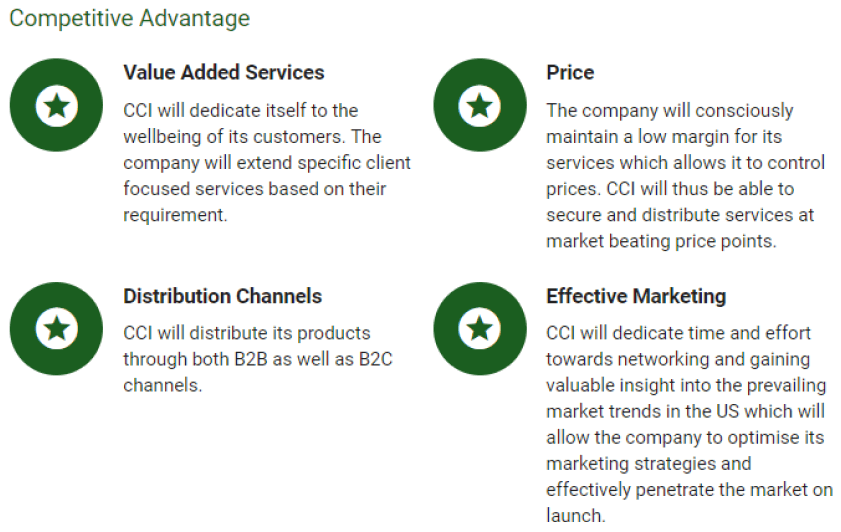
Here’s an example of a competitive advantage for a consultancy business using Upmetrics.
4. Service Offerings
Consulting businesses offer a variety of consulting services. In this section of your consulting business plan, you will create a clear list of all the services you will be offering.
The list can include various business consulting services such as:
- Strategy consulting
- Operation consulting
- Human resources consulting
- IT Consulting
- Risk and compliance consulting
Now, elaborate on these services to help your readers understand what it truly entails. Refer to this example of legal and compliance services brief description:
As part of our risk and compliance service, the company will offer:
- Draft, negotiate, and conclude ‘Joint Venture Agreements’, and ‘Memoranda of cases for one of our key clients.
- Legal Advice & Consultation
- Case Litigation & Pleading
- Legal Translation
- Business Start-up Advice
- Management Consultancy
- Representation and Attorney Services
- Legal Compliance
Determine the pricing of these services and place it alongside your service list. Ideally, you should create differential and tiered pricing plans for your services to cater to different target audiences.
All in all, make this section an informative read for your readers helping them understand your unique business offerings.
5. Marketing Plan
A well-defined marketing plan is among the most important components of your consulting firm’s business plan. Well, It’s time to design your marketing strategies using your market research about the target customers and the potential clients.
Multifarious marketing efforts are essential to make your new business visibly famous in the market. Well, here are a few strategies that a successful consultant follows religiously:
Social media marketing
Choose different social media platforms to build your consultancy brand online. LinkedIn can be a good choice for a consultancy business followed by FaceBook and Instagram. Create your marketing plans for different platforms and be consistent with your posting there.
Informative website
Build an informative website for your consulting business and enhance its ranking on search engines by creating a dedicated content marketing program.
Email marketing
A well-defined email marketing program to attract new clients, newsletters for subscribed customers, and promotional services offer to convert a potential customer base.
Targeted advertising
Running a paid ads program to reach targeted small businesses and potential clients.
Refer to this example of marketing and promotion programs for your consultancy from Upmetrics.
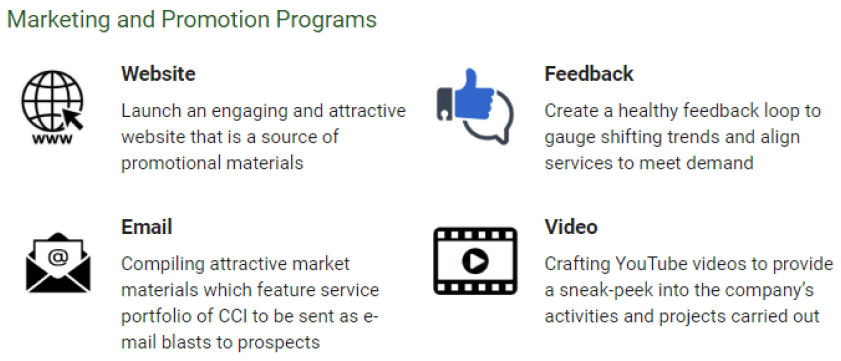
In this section of your consulting business plan, also highlight your marketing budget and its allocation to different marketing activities.
6. Management Consulting Team
Introduce your managerial team in this section of your consultant business plan by showing how you have the right people to run a successful consultancy.
Begin by introducing the people at top managerial positions and offer a brief description depicting their skills, expertise, and experience in offering specific consulting services.
Refer to this example introducing the managing director of a consulting agency.
Mr. Ashton will serve as the Managing Director of CCI. A highly motivated and dynamic individual, Thomas boasts vast experience in the field of aesthetics having spent a career spanning 14 years essaying various white-collar roles for aesthetic companies across America. His ability to multi-task and expertly weave through operational pitfalls equips him with exceptional management and administrative skills. The US operations include sourcing, interacting, and building client relations across the industry value chain involving professional salons and end-user clientele. Mr. Ashton’s expert management and industry-specific skills will play an instrumental role in achieving the parent company’s goal of establishing a sustainable and reliable aesthetic brand in the US.
Don’t limit this section to the introduction of owners and managers. Instead, introduce every person who’s an asset to your business and can contribute significantly to your business goals.
In this section, you will also highlight the organizational design to offer a clear understanding of the hierarchy in your consulting firm. And lastly, don’t forget to add the salaries and wages of these people alongside their roles while creating your management plan.
7. Operational Plan
The operations plan shows that you don’t only have the means but also the knack to operate the consulting business efficiently.
This section of your business plan highlights the processes and procedures essential to run the everyday operations of your consulting business and the milestones you wish to achieve.
Confused what should you include in your operations plan? Let’s check this out:
Hiring plan
Mention the number of project managers, analysts, BD, administrative, and support workers needed for your business. Briefly describe the qualifications, skill sets, and experience for these roles and lay your hiring plan to hire employees.
Refer to this example of a hiring plan for a consultancy by Upmetrics.
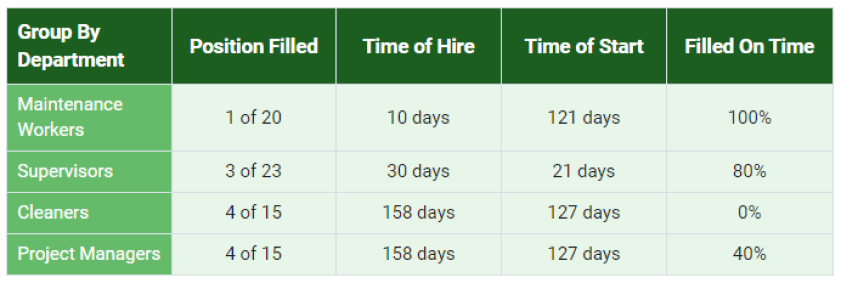
Operational processes
Briefly explain the different processes and procedures of your business in the consulting industry. This includes processes for client acquisition, service delivery, project management process, quality assessment, and client retention.
Tools and equipment
Mention all the equipment you will require to deliver quality consulting services to the clients. Also, include the pricing of these equipment and how you plan to source them from the market.
Overall, think of smaller nuances and make this section as brief and detailed as possible. Consider it as a guidebook that will answer all the operational queries that arise while running the business.
8. Financial Outlook
A comprehensive financial plan is the most crucial component of your business plan and sometimes it is the only section investors or readers might be interested in.
So work on putting together a well-detailed financial plan with realistic financial forecasts to increase the weight of your consulting plan.
The projections in a financial plan are important because they help the readers gauge the financial viability of your business idea. They offer a clear picture of the profitability, growth potential, and cash-generating capacity of your consulting business.
To create a befitting plan, begin by offering a detailed insight into your startup costs, revenue streams, profit margins, operational costs, and cash flow projections. Gather these projections to work on your key reports.
Refer to different business plans to see what more could you add to your financial section apart from these key essentials:
- Balance sheet
- Profit and loss statement/ Income statement
- Cash flow statement
- Break-even analysis
- Investment plan
While making a financial plan, ensure that you figure out the calculations for the next 3-5 years. And yes, we agree that calculating all these financial projections from scratch can get overwhelming. However, with this financial forecasting tool from Upmetrics , the entire task of creating a detailed plan will get much easier and more effective.
Simply enter the details in the tab and let the tool undertake all the manual calculations and create engaging visual reports to add to your plan.
Get Your Free Management Consulting Business Plan
Need help writing the contents of your management consulting business plan? Well, here you go. Download our management consulting business plan pdf and start writing.
Our intuitive and modern consulting business plan template offers a step-by-step guide with relevant examples to speed up your process of writing an effective business plan. It will get your actionable plan ready while ensuring that you add all the crucial details to it.
The Quickest Way to turn a Business Idea into a Business Plan
Fill-in-the-blanks and automatic financials make it easy.
Start preparing your business plan with Upmetrics AI
And here we are. Now that you are aware of how to write an effective business plan using our consulting business plan template, you are one step closer to starting your business with a bang.
But that’s not it. What if we tell you that your business planning process can be made easier and more efficient with a few cutting-edge tools? Well, the Upmetrics business planning app is here at your service.
With an AI assistant to speed up your writing process, financial forecasting tools to help you with projections, and thousands of free educational guides to help you set up the business- we think you get it all with Upmetrics.
Get started now.
Related Posts
Bookkeeping Business Plan
Virtual Assistant Business Plan
How to Write Customer Analysis for Business Plan
Step-by-Step Guide to Writing a Business Plan
Engineering Consulting Business Plan
Marketing Consulting Business Plan
Frequently asked questions, what are the key components of a management consulting business plan.
While there are no fixed rules regarding what to include in your consulting business plan, you can ensure that you don’t miss adding these key components to your plan:
- Executive summary
- Company overview
- Market and competitor analysis
- Service offerings
- Management team
- Operations plan
- Financial plan
What financial projections should be included in the business plan?
While making your consulting business plan, ensure that you add the financial forecasts for startup costs, expenses, revenue, cash flow, sales, and expected profitability to your plan.

How often should I update my Management Consulting Business Plan?
Ideally, you should update your business plan at least once a year since you operate in a highly dynamic industry. However, if you feel that the yearly updates are insufficient, you can also review and update your plan every quarter.
How should I approach the funding section of my business plan?
Begin by calculating your startup costs and the actual monetary situation to evaluate the funding needs for your business. Thereafter check the potential funding sources and their application procedure to avail required funding.
As a consulting business, you can choose one of these funding sources:
- Private loan
- SBA approved loans
- Angel Investors
- Venture Capitalist firms
- Crowdfunding
Can the business plan help in securing funding or investments?
Absolutely it does. Investors, credit lenders, and banks will look after your business plan before accepting the funding request for your business. This is because a business plan offers a clear understanding of your business idea while simultaneously vouching for the financial feasibility of your plan.
What legal considerations should I include in my business plan?
Here are a few of the legal considerations you should make while writing your business plan:
- Business licenses and permits
- Health safety compliance
- Insurance coverage
- Legal business structure
- Employment laws
About the Author

Vinay Kevadiya
Vinay Kevadiya is the founder and CEO of Upmetrics, the #1 business planning software. His ultimate goal with Upmetrics is to revolutionize how entrepreneurs create, manage, and execute their business plans. He enjoys sharing his insights on business planning and other relevant topics through his articles and blog posts. Read more
Plan your business in the shortest time possible
No Risk – Cancel at Any Time – 15 Day Money Back Guarantee
Popular Templates

Create a great Business Plan with great price.
- 400+ Business plan templates & examples
- AI Assistance & step by step guidance
- 4.8 Star rating on Trustpilot
Streamline your business planning process with Upmetrics .


1-Page Business Plan For Consultants (Template Included)
In 2018, Laura Posey received the worst news you could imagine.
Her partner was diagnosed with cancer.
She could no longer run her company, Simple Success Plans , because her new full-time position was taking care of her partner.
But Laura had something that many consultants don’t — a clear, strategic plan.
Before taking time off to take care of her partner, she gave that plan to her team, and told them to “go make it happen.”
They did just that.
This plan allowed Laura to step out of the business for an entire year.
Everything still got done.
And with her 1-page business plan, she got to do a far more important job.
If you’re feeling “all over the place” in your consulting business and lack a clear plan on how to get to where you want, you need to write that plan.
But not just any plan.
You need a plan that fits on 1-page, forcing you to prioritize what’s truly important to your business and your life.
By the end of this post, you’ll have a 1-page business plan for your consulting business which you will use to achieve your revenue goals — and build the consulting business that supports your desired lifestyle.
Declare Your 5 Core Values
First things first — you must declare the core values of your business.
You’ll write 5 of them. One core value for each finger on one hand, making them easy to remember.
A core value is something that shapes the way you see and behave — similar to a mindset .
Core values often come from the heart. You don’t just think about them — you feel them at your core.
Core values are decision-making criteria. They are a primary filter that makes sure what you do is in alignment with the business that you want to build.
If a new opportunity comes your way, it must be congruent with your core values. If not, you will happily say no to it.
Examples of core values:
- “We will have each other’s back.” This core value is about teamwork. In Laura’s business, if someone needs help or support, they know they can trust in the team to provide that.
- “We will try and figure it out ourselves.” This core value is about delegation. Laura knows she doesn’t have all of the answers. So she trusts her team to solve problems autonomously, without micromanagement. This core value also ensures that they hire problem solvers who want to solve problems on their own.
- “We will support out-of-the-box thinking.” This core value is about creativity, taking chances, and trying new things. If you deeply value-creating new things, even if they might be inefficient, then this would be a good core value for your business.

With your 5 core values in place, you’ll get clear on your business vision .
Get Clear On Your Vision
Where do you want to take your business?
This is your vision .
Imagine how you want your business to look. Imagine how it helps support your desired lifestyle.
Dream big. This is where you picture yourself living the lifestyle that prompted you to start your consulting business in the first place. It’s your source of motivation — your desired future state.
Your vision should include a mix of your business and your personal life.
Here are some examples of vision:
- “I want to be the go-to expert in my industry who is so successful that key industry players come to me first when they are seeking advice.”
- “I want to change the way healthcare is run and convince insurance companies that they should cover preventative and alternative medicine practices.”
- “I want to buy a home for my parents and pay for live-in care so they can grow old comfortably in their own home.”
And one final example from Laura’s business — and a story about how she made it happen.
“I want to build a business where I can work from anywhere and don’t have to travel for work.”

Laura values location independence — the ability to work from anywhere.
Years ago, her business partner was making her miserable. She wanted out.
She called her landlord and asked him “what would it cost to get out of this lease?”
It wasn’t cheap.
To get out of the lease, she had to cut her expenses way, way down.
She wanted a business where she could work from anywhere — so she never felt “trapped” in a single location ever again.
So, she told her clients she was cutting down on travel. Much to her surprise, many of them were delighted.
It would save them a lot of money.
It took her a full year to transition…but she took action to make her vision a reality.
You must state your vision before you can make them real.
Once you’ve done that, you will get more tangible: starting with your long-term targets.
Aim At Your Long Term Targets
Your long-term targets are where you want to be in 3-5 years.
They are medium-resolution — specific enough to give you something to aim at, but vague enough to give you some wiggle room.
Ultimately, these targets are the building blocks of turning your vision into reality.
Examples of long-term targets (3-5 years):
- Hit a revenue of $2M+ (your number may be higher or lower)
- Invest in a second office
- Take 4 weeks of vacation
Once you’ve written down your long-term targets, you can set your short-term goals.
Set Your Short Term Goals
Your short-term goals are goals you want to hit within one year.
Unlike long-term targets, they are very detailed and specific.

When writing them, visualize what they look like once they’re complete.
Like your long-term targets, they should help you fulfill your vision.
Examples of short-term goals (1 year)
- Hire a full-time administrative assistant who handles all of my low-hour tasks
- Create a new productized service with a value of $2500
- Cut my hours to 35/week
After setting your short-term goals, you can narrow down to your daily tasks with a checklist.
Breaking It Down: The Daily Success Checklist
What are you doing today to hit your goals?
To create your vision?
To align with your core values?
The Daily Success Checklist keeps you accountable. It’s something you can follow every day to ensure you hit your goals and create your dream business.
Here’s what it looks like:

The Daily Success Checklist is broken down into these areas:
- Success Habits : The daily habits you must achieve to hit your goals. A good one here is making sure you reach out to a certain amount of ideal clients — what we call your “Magic Number.”
- Goals : You can insert your short-term goals here to keep them in focus.
- Key Three : Your three important areas of focus for today — where you want to improve.
- Other Tasks : Miscellaneous tasks that you must complete to finish the day.
- Reflection : After your day is done, answer these reflection questions. They’ll help you analyze what you did well and how you can improve — and be grateful for another day getting one step closer to your desired life and business.
Just like the strategic plan, this checklist also fits on one page. As you go through your day, check off the tasks you complete.
Do this every day, and you’ll be working towards making your vision a reality.
Action Step: Complete Your 1 Page Business Plan
Your action step for this article is to write your 1 page business plan .
Using the guidelines in this article, write down your…
- 5 core values
- Business vision
- Long-term targets
- Short-term goals
…and then print it out. Put it on your desk, where you can’t miss it.
Finally, download Laura’s Daily Success Checklist , and build a habit of using it every day.
You can find Laura’s strategic plan system here if you’d like to do this with her help.
Until you make your core values, vision, and goals explicit, you’ll never have 100% clarity on what you should be doing in your business — and why.
By getting focused, you’ll put yourself on the path to build the highly profitable business of your dreams.
- What are some examples of your core values?
- What is your vision for your dream business and lifestyle ?
- What are you doing daily to make it all a reality?
Leave a comment below — and join the discussion!
If you’d like to join a like-minded community of consultants who are all helping each other achieve the business of their dreams, check out our Clarity Coaching Program.
“Michael and Sam run a great program. It’s not cookie-cutter. They meet you where you are, listen well, and provide relevant solutions. They plug you into a community of peers, which is so important if you’re just starting out. You don’t have to figure it all out on your own! ”
(Read Mike’s full consulting case study )
Leave a Comment, Join the Conversation! Cancel reply
Your Email will be kept private and will not be shown publicly.
Privacy Overview
START YOUR ECOMMERCE BUSINESS FOR JUST $1
- Skip to primary navigation
- Skip to main content
A magazine for young entrepreneurs
The best advice in entrepreneurship
Subscribe for exclusive access, how to write a business plan (tips, templates, examples).

Written by Jesse Sumrak | May 14, 2023
Comments -->

Get real-time frameworks, tools, and inspiration to start and build your business. Subscribe here
Business plans might seem like an old-school stiff-collared practice, but they deserve a place in the startup realm, too. It’s probably not going to be the frame-worthy document you hang in the office—yet, it may one day be deserving of the privilege.
Whether you’re looking to win the heart of an angel investor or convince a bank to lend you money, you’ll need a business plan. And not just any ol’ notes and scribble on the back of a pizza box or napkin—you’ll need a professional, standardized report.
Bah. Sounds like homework, right?
Yes. Yes, it does.
However, just like bookkeeping, loan applications, and 404 redirects, business plans are an essential step in cementing your business foundation.
Don’t worry. We’ll show you how to write a business plan without boring you to tears. We’ve jam-packed this article with all the business plan examples, templates, and tips you need to take your non-existent proposal from concept to completion.
Table of Contents
What Is a Business Plan?
Tips to Make Your Small Business Plan Ironclad
How to Write a Business Plan in 6 Steps
Startup Business Plan Template
Business Plan Examples
Work on Making Your Business Plan
How to Write a Business Plan FAQs
What is a business plan why do you desperately need one.
A business plan is a roadmap that outlines:
- Who your business is, what it does, and who it serves
- Where your business is now
- Where you want it to go
- How you’re going to make it happen
- What might stop you from taking your business from Point A to Point B
- How you’ll overcome the predicted obstacles
While it’s not required when starting a business, having a business plan is helpful for a few reasons:
- Secure a Bank Loan: Before approving you for a business loan, banks will want to see that your business is legitimate and can repay the loan. They want to know how you’re going to use the loan and how you’ll make monthly payments on your debt. Lenders want to see a sound business strategy that doesn’t end in loan default.
- Win Over Investors: Like lenders, investors want to know they’re going to make a return on their investment. They need to see your business plan to have the confidence to hand you money.
- Stay Focused: It’s easy to get lost chasing the next big thing. Your business plan keeps you on track and focused on the big picture. Your business plan can prevent you from wasting time and resources on something that isn’t aligned with your business goals.
Beyond the reasoning, let’s look at what the data says:
- Simply writing a business plan can boost your average annual growth by 30%
- Entrepreneurs who create a formal business plan are 16% more likely to succeed than those who don’t
- A study looking at 65 fast-growth companies found that 71% had small business plans
- The process and output of creating a business plan have shown to improve business performance
Convinced yet? If those numbers and reasons don’t have you scrambling for pen and paper, who knows what will.
Don’t Skip: Business Startup Costs Checklist
Before we get into the nitty-gritty steps of how to write a business plan, let’s look at some high-level tips to get you started in the right direction:
Be Professional and Legit
You might be tempted to get cutesy or revolutionary with your business plan—resist the urge. While you should let your brand and creativity shine with everything you produce, business plans fall more into the realm of professional documents.
Think of your business plan the same way as your terms and conditions, employee contracts, or financial statements. You want your plan to be as uniform as possible so investors, lenders, partners, and prospective employees can find the information they need to make important decisions.
If you want to create a fun summary business plan for internal consumption, then, by all means, go right ahead. However, for the purpose of writing this external-facing document, keep it legit.
Know Your Audience
Your official business plan document is for lenders, investors, partners, and big-time prospective employees. Keep these names and faces in your mind as you draft your plan.
Think about what they might be interested in seeing, what questions they’ll ask, and what might convince (or scare) them. Cut the jargon and tailor your language so these individuals can understand.
Remember, these are busy people. They’re likely looking at hundreds of applicants and startup investments every month. Keep your business plan succinct and to the point. Include the most pertinent information and omit the sections that won’t impact their decision-making.
Invest Time Researching
You might not have answers to all the sections you should include in your business plan. Don’t skip over these!
Your audience will want:
- Detailed information about your customers
- Numbers and solid math to back up your financial claims and estimates
- Deep insights about your competitors and potential threats
- Data to support market opportunities and strategy
Your answers can’t be hypothetical or opinionated. You need research to back up your claims. If you don’t have that data yet, then invest time and money in collecting it. That information isn’t just critical for your business plan—it’s essential for owning, operating, and growing your company.
Stay Realistic
Your business may be ambitious, but reign in the enthusiasm just a teeny-tiny bit. The last thing you want to do is have an angel investor call BS and say “I’m out” before even giving you a chance.
The folks looking at your business and evaluating your plan have been around the block—they know a thing or two about fact and fiction. Your plan should be a blueprint for success. It should be the step-by-step roadmap for how you’re going from Point A to Point B.

How to Write a Business Plan—6 Essential Elements
Not every business plan looks the same, but most share a few common elements. Here’s what they typically include:
- Executive Summary
- Business Overview
- Products and Services
- Market Analysis
- Competitive Analysis
- Financial Strategy
Below, we’ll break down each of these sections in more detail.
1. Executive Summary
While your executive summary is the first page of your business plan, it’s the section you’ll write last. That’s because it summarizes your entire business plan into a succinct one-pager.
Begin with an executive summary that introduces the reader to your business and gives them an overview of what’s inside the business plan.
Your executive summary highlights key points of your plan. Consider this your elevator pitch. You want to put all your juiciest strengths and opportunities strategically in this section.
2. Business Overview
In this section, you can dive deeper into the elements of your business, including answering:
- What’s your business structure? Sole proprietorship, LLC, corporation, etc.
- Where is it located?
- Who owns the business? Does it have employees?
- What problem does it solve, and how?
- What’s your mission statement? Your mission statement briefly describes why you are in business. To write a proper mission statement, brainstorm your business’s core values and who you serve.
Don’t overlook your mission statement. This powerful sentence or paragraph could be the inspiration that drives an investor to take an interest in your business. Here are a few examples of powerful mission statements that just might give you the goosebumps:
- Patagonia: Build the best product, cause no unnecessary harm, use business to inspire and implement solutions to the environmental crisis.
- Tesla: To accelerate the world’s transition to sustainable energy.
- InvisionApp : Question Assumptions. Think Deeply. Iterate as a Lifestyle. Details, Details. Design is Everywhere. Integrity.
- TED : Spread ideas.
- Warby Parker : To offer designer eyewear at a revolutionary price while leading the way for socially conscious businesses.
3. Products and Services
As the owner, you know your business and the industry inside and out. However, whoever’s reading your document might not. You’re going to need to break down your products and services in minute detail.
For example, if you own a SaaS business, you’re going to need to explain how this business model works and what you’re selling.
You’ll need to include:
- What services you sell: Describe the services you provide and how these will help your target audience.
- What products you sell: Describe your products (and types if applicable) and how they will solve a need for your target and provide value.
- How much you charge: If you’re selling services, will you charge hourly, per project, retainer, or a mixture of all of these? If you’re selling products, what are the price ranges?
4. Market Analysis
Your market analysis essentially explains how your products and services address customer concerns and pain points. This section will include research and data on the state and direction of your industry and target market.
This research should reveal lucrative opportunities and how your business is uniquely positioned to seize the advantage. You’ll also want to touch on your marketing strategy and how it will (or does) work for your audience.
Include a detailed analysis of your target customers. This describes the people you serve and sell your product to. Be careful not to go too broad here—you don’t want to fall into the common entrepreneurial trap of trying to sell to everyone and thereby not differentiating yourself enough to survive the competition.
The market analysis section will include your unique value proposition. Your unique value proposition (UVP) is the thing that makes you stand out from your competitors. This is your key to success.
If you don’t have a UVP, you don’t have a way to take on competitors who are already in this space. Here’s an example of an ecommerce internet business plan outlining their competitive edge:
FireStarters’ competitive advantage is offering product lines that make a statement but won’t leave you broke. The major brands are expensive and not distinctive enough to satisfy the changing taste of our target customers. FireStarters offers products that are just ahead of the curve and so affordable that our customers will return to the website often to check out what’s new.
5. Competitive Analysis
Your competitive analysis examines the strengths and weaknesses of competing businesses in your market or industry. This will include direct and indirect competitors. It can also include threats and opportunities, like economic concerns or legal restraints.
The best way to sum up this section is with a classic SWOT analysis. This will explain your company’s position in relation to your competitors.
6. Financial Strategy
Your financial strategy will sum up your revenue, expenses, profit (or loss), and financial plan for the future. It’ll explain how you make money, where your cash flow goes, and how you’ll become profitable or stay profitable.
This is one of the most important sections for lenders and investors. Have you ever watched Shark Tank? They always ask about the company’s financial situation. How has it performed in the past? What’s the ongoing outlook moving forward? How does the business plan to make it happen?
Answer all of these questions in your financial strategy so that your audience doesn’t have to ask. Go ahead and include forecasts and graphs in your plan, too:
- Balance sheet: This includes your assets, liabilities, and equity.
- Profit & Loss (P&L) statement: This details your income and expenses over a given period.
- Cash flow statement: Similar to the P&L, this one will show all cash flowing into and out of the business each month.
It takes cash to change the world—lenders and investors get it. If you’re short on funding, explain how much money you’ll need and how you’ll use the capital. Where are you looking for financing? Are you looking to take out a business loan, or would you rather trade equity for capital instead?
Read More: 16 Financial Concepts Every Entrepreneur Needs to Know
Startup Business Plan Template (Copy/Paste Outline)
Ready to write your own business plan? Copy/paste the startup business plan template below and fill in the blanks.
Executive Summary Remember, do this last. Summarize who you are and your business plan in one page.
Business Overview Describe your business. What’s it do? Who owns it? How’s it structured? What’s the mission statement?
Products and Services Detail the products and services you offer. How do they work? What do you charge?
Market Analysis Write about the state of the market and opportunities. Use date. Describe your customers. Include your UVP.
Competitive Analysis Outline the competitors in your market and industry. Include threats and opportunities. Add a SWOT analysis of your business.
Financial Strategy Sum up your revenue, expenses, profit (or loss), and financial plan for the future. If you’re applying for a loan, include how you’ll use the funding to progress the business.
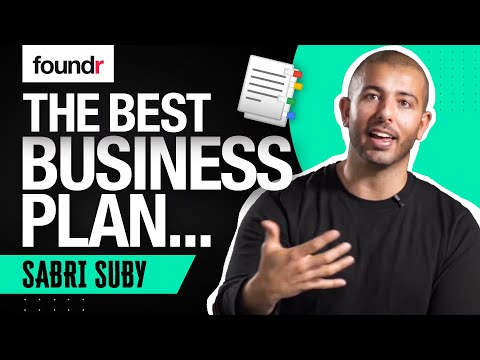
5 Frame-Worthy Business Plan Examples
Want to explore other templates and examples? We got you covered. Check out these 5 business plan examples you can use as inspiration when writing your plan:
- SBA Wooden Grain Toy Company
- SBA We Can Do It Consulting
- OrcaSmart Business Plan Sample
- Plum Business Plan Template
- PandaDoc Free Business Plan Templates
Get to Work on Making Your Business Plan
If you find you’re getting stuck on perfecting your document, opt for a simple one-page business plan —and then get to work. You can always polish up your official plan later as you learn more about your business and the industry.
Remember, business plans are not a requirement for starting a business—they’re only truly essential if a bank or investor is asking for it.
Ask others to review your business plan. Get feedback from other startups and successful business owners. They’ll likely be able to see holes in your planning or undetected opportunities—just make sure these individuals aren’t your competitors (or potential competitors).
Your business plan isn’t a one-and-done report—it’s a living, breathing document. You’ll make changes to it as you grow and evolve. When the market or your customers change, your plan will need to change to adapt.
That means when you’re finished with this exercise, it’s not time to print your plan out and stuff it in a file cabinet somewhere. No, it should sit on your desk as a day-to-day reference. Use it (and update it) as you make decisions about your product, customers, and financial plan.
Review your business plan frequently, update it routinely, and follow the path you’ve developed to the future you’re building.
Keep Learning: New Product Development Process in 8 Easy Steps
What financial information should be included in a business plan?
Be as detailed as you can without assuming too much. For example, include your expected revenue, expenses, profit, and growth for the future.
What are some common mistakes to avoid when writing a business plan?
The most common mistake is turning your business plan into a textbook. A business plan is an internal guide and an external pitching tool. Cut the fat and only include the most relevant information to start and run your business.
Who should review my business plan before I submit it?
Co-founders, investors, or a board of advisors. Otherwise, reach out to a trusted mentor, your local chamber of commerce, or someone you know that runs a business.
Ready to Write Your Business Plan?
Don’t let creating a business plan hold you back from starting your business. Writing documents might not be your thing—that doesn’t mean your business is a bad idea.
Let us help you get started.
Join our free training to learn how to start an online side hustle in 30 days or less. We’ll provide you with a proven roadmap for how to find, validate, and pursue a profitable business idea (even if you have zero entrepreneurial experience).
Stuck on the ideas part? No problem. When you attend the masterclass, we’ll send you a free ebook with 100 of the hottest side hustle trends right now. It’s chock full of brilliant business ideas to get you up and running in the right direction.

About Jesse Sumrak
Jesse Sumrak is a writing zealot focused on creating killer content. He’s spent almost a decade writing about startup, marketing, and entrepreneurship topics, having built and sold his own post-apocalyptic fitness bootstrapped business. A writer by day and a peak bagger by night (and early early morning), you can usually find Jesse preparing for the apocalypse on a precipitous peak somewhere in the Rocky Mountains of Colorado.
Related Posts

How Shay Mitchell Is Disrupting a $17B Industry

MaryRuth Ghiyam: From $700K in Debt to $100M in Revenue

His Ecommerce Funnel Generated $70M Last Year

How Do You Launch a Product?

Why Erin Deering Sold Swimwear Sensation Triangl

How Suneera Madhani’s Rejected Pitch Led to a Billion-Dollar Startup

When to Quit Your Job and Go All-in on Your Side Hustle

How to Choose the Right Color for Your Logo: The Ultimate Cheat Sheet

How becx’s Becky Verma Gained the Confidence to Become an Entrepreneur

How the D’Amelios Built an Empire Using TikTok

Almost Failed Startups: What You Can Learn from 8 Startups That Made It Big

How to Implement AI in Your Business from Consultant Nat Choprasert

Self-Made Mogul Emma Grede on Building SKIMS and Good American – Exclusive

20 Reasons to Start Your Own Business Today

The Horror Stories and Surprises from Nathan Chan’s 500 Founder Interviews
FREE TRAINING FROM LEGIT FOUNDERS
Actionable Strategies for Starting & Growing Any Business.
Don't Miss Out! Get Instant Access to foundr+ for Just $1!
1000+ lessons. customized learning. 30,000+ strong community..

- Starting a Business
- Growing a Business
- Small Business Guide
- Business News
- Science & Technology
- Money & Finance
- For Subscribers
- Write for Entrepreneur
- Entrepreneur Store
- United States
- Asia Pacific
- Middle East
- South Africa
Copyright © 2024 Entrepreneur Media, LLC All rights reserved. Entrepreneur® and its related marks are registered trademarks of Entrepreneur Media LLC
How to Start a Consulting Business: Your One Page Business Plan Learn the three critical components of your business plan and download a template to get started
By Terry Rice Edited by Dan Bova Apr 28, 2021
I wrote several business plans while obtaining my MBA from the University at Buffalo. But, for some reason, I totally skipped that part when it was time to launch my consulting business. My only real plan was to generate revenue, which often involved saying "yes!" to any opportunity that came my way, and not charging nearly enough for the services. And, when my daughter was born, I was too concerned about the future to be fully present. I was there, but I was more preoccupied with worrying about how I would provide for her than I was with enjoying and appreciating the experience.
Fortunately, that all changed once I decided to create a real plan aligned with the vision I had for my business and my family. That was six years ago and I've now packaged it as the One Page Business Plan for Consultants . I'm sharing the framework with you so you can avoid my mistakes, and compress the amount of time it takes for you to find fulfillment. This is by no means a hack - you're going to put in work - but this guide will reduce the confusion and frustration that can come from starting a new business.
I should also note that you may not complete it in one sitting. By design, it will challenge you and expose blind spots you may not be aware of. That's a good thing! Addressing these critical issues now will save you from months - possibly even years - of self-doubt and lost revenue.
And, if you're currently offering professional services , but are wondering why you haven't been able to "figure it out" just yet, this plan could be the key to unlocking your revenue potential.
It's all centered around answering three critical questions, which I've highlighted below.
Related: Learn how to package, price, and promote your consulting services
What do you do, who do you do it for, and why?
Clarity is the precursor to confidence. Once you establish clarity on your services, audience and motivation; you'll be able to confidently move forward with the next steps. I address how to get clear on your services in the article How to Start a Consulting Business: 3 Steps to Finding Your Idea , so I suggest checking that out in addition to the guidance provided in the business plan.
Be sure not to skip defining your "WHY" - the purpose, the cause, or the belief that drives you - this will become a valuable differentiator as you grow your business. And, if you need help crafting yours, Simon Sinek literally wrote the book on it, but you can also check out his brief YouTube video that provides some valuable tips.
How do you attract clients and opportunities by expressing your expertise and personality? (Marketing)
When I first started offering Digital Marketing services, I visited a local business in Brooklyn so I could pitch them in person. I knew launching a business would require stepping out of my comfort zone and I saw this as the perfect opportunity to do so. Incredibly enough, they said "yes", but I never did door-to-door sales again. Why? Because I hated it, and I knew there had to be a more efficient way.
Your goal should be to land clients based on how you feel comfortable presenting yourself and the value you provide. Not by spending 20 minutes hyping yourself up by listening to Eminem's "Lose Yourself" on repeat before you finally get enough courage to ask for their business. Everyone may be telling you to join Clubhouse , but answering questions on Quora might be a better fit for your personality.
It's also crucial to attract the right prospects. I used to get contacted by people who asked how much I charged before asking how I could help. In time, you'll learn how to weed those people out so you can focus on prospects who understand the value you provide and are willing to pay you what you're worth.
Beyond that, your marketing tactics need to be measurable and repeatable. Otherwise, you won't know how to avoid making the same mistakes or double down on what's working for you.
Related: How to Grow Your Email List and Sales Pipeline by Creating Your Own Free Mini-Course
How do you deliver your services and scale revenue? (Delivery)
Experiencing burnout — emotional, physical, and mental exhaustion caused by excessive and prolonged stress — is far too common with entrepreneurs. One way to avoid it: develop a process to deliver your services that is aligned with efficiency and impact.
While custom projects can be lucrative, they also require much more coordination and development. Defining the delivery - and pricing - of your services in advance allows you to create a business model that is aligned with your desired revenue and lifestyle goals.
You can see options for delivering your services below.
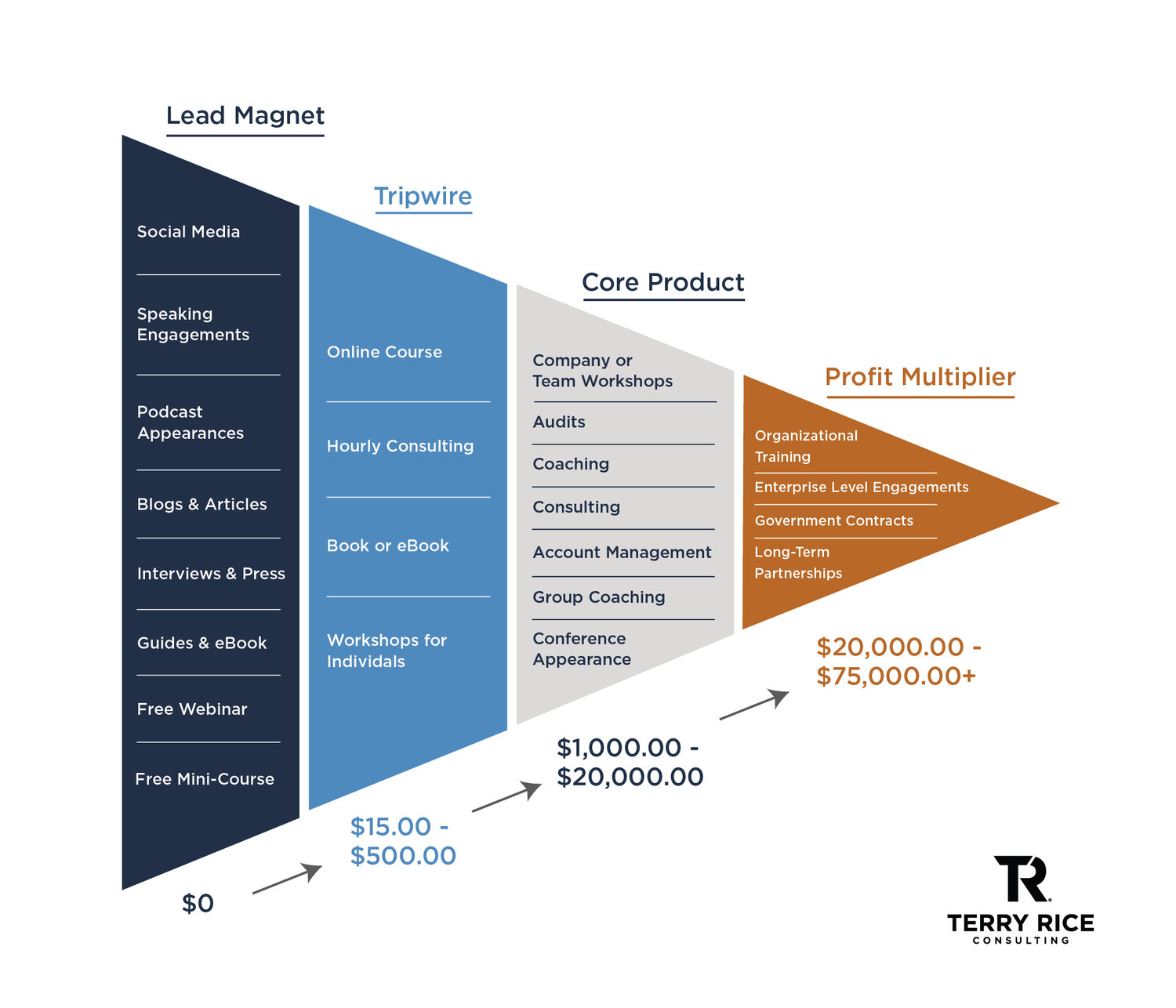
By documenting this process, you'll also be able to better project and scale revenue, which reduces uncertainty and gives you the freedom to take time off without worrying about where your next paycheck is coming from.
Related: How to Start a Consulting Business: Determining Your Rates
Download the One Page Business Plan and block off three hours to work on it. I suggest working for 50 minutes, taking a 10-minute break, and repeating that cycle three times. And, if you have any questions feel free to reach to me on LinkedIn or join a live Q&A session .
Ready to start your consulting business? Check out our Consulting Business Accelerator and get going today! You'll gain access to training videos, hands-on activities and join live weekly Q&A calls.
Entrepreneur Staff
Business Development Expert-in-Residence
Terry Rice is the Business Development Expert-in-Residence at Entrepreneur and Managing Director of Growth & Partnerships at Good People Digital ; an agency that provides marketing and monetization solutions for entrepreneurs. He writes a newsletter about how to build your business and personal resilience and personal brand in just 5 minutes per week and created a revenue optimization checklist to help you multiply your income potential.
Want to be an Entrepreneur Leadership Network contributor? Apply now to join.
Editor's Pick Red Arrow
- Lock 3 Things Your Business Idea Must Have to Succeed — as Proven By Famous Harvard Business School Startups
- This Couple Cashed in Their 401ks to Launch a Virtual Business — Here's How It Led to a 9-Figure Exit and Co-Owning 2 Professional Soccer Teams
- Lock The No. 1 State to Retire in Might Not Even Be on Your Radar, According to a New Report
- Lock 12 Books That Self-Made Millionaires Swear By
- Lock These Are the Highest-Paying Side Hustles for a Single Day of Work
- Use These 3 Steps to Find the Perfect Franchise Opportunity for You
Most Popular Red Arrow
Make music from prompts with this ai subscription, just $50.
This AI music generator promises to take you from prompt to song in just a few seconds.
Scarlett Johansson 'Shocked' That OpenAI Used a Voice 'So Eerily Similar' to Hers After Already Telling the Company 'No'
Johansson asked OpenAI how they created the AI voice that her "closest friends and news outlets could not tell the difference."
How to Start an Event Planning Business: Your Comprehensive Guide
Not sure how to become an event planner? Use this step-by-step guide to launch your event planning business from scratch.
Now that OpenAI's Superalignment Team Has Been Disbanded, Who's Preventing AI from Going Rogue?
We spoke to an AI expert who says safety and innovation are not separate things that must be balanced; they go hand in hand.
Beyond the Great Resignation — How to Attract Freelancers and Independent Talent Back to Traditional Work
Discussing the recent workplace exit of employees in search of more meaningful work and ways companies can attract that talent back.
What Franchising Can Teach The NFL About The Impact of Private Equity
The NFL is smart to take a thoughtful approach before approving institutional capital's investment in teams.
Successfully copied link

IT Consulting Business Plan Template
Written by Dave Lavinsky

IT Consulting Business Plan
Over the past 20+ years, we have helped over 500 entrepreneurs and business owners create business plans to start and grow their IT consulting firms.
If you’re unfamiliar with creating an IT consulting business plan, you may think creating one will be a time-consuming and frustrating process. For most entrepreneurs it is, but for you, it won’t be since we’re here to help. We have the experience, resources, and knowledge to help you create a great business plan.
In this article, you will learn some background information on why business planning is important. Then, you will learn how to write a IT consulting business plan step-by-step so you can create your plan today.
Download our Ultimate Business Plan Template here >
What is an IT Consulting Business Plan?
A business plan provides a snapshot of your IT consulting business as it stands today, and lays out your growth plan for the next five years. It explains your business goals and your strategies for reaching them. It also includes market research to support your plans.
Why You Need a Business Plan for an IT Consulting Firm
If you’re looking to start an IT consulting business or grow your existing IT consulting company, you need a business plan. A business plan will help you raise funding, if needed, and plan out the growth of your IT consulting business to improve your chances of success. Your IT consulting business plan is a living document that should be updated annually as your company grows and changes.
Sources of Funding for an IT Consulting Businesses
With regards to funding, the main sources of funding for an IT consulting business are personal savings, credit cards, bank loans, and angel investors. When it comes to bank loans, banks will want to review your business plan and gain confidence that you will be able to repay your loan and interest. To acquire this confidence, the loan officer will not only want to ensure that your financials are reasonable, but they will also want to see a professional plan. Such a plan will give them the confidence that you can successfully and professionally operate a business. Personal savings and bank loans are the most common funding paths for IT consulting companies.
Finish Your Business Plan Today!
How to write a business plan for an it consulting business.
If you want to start an IT consulting business or expand your current one, you need a business plan. The guide below details the necessary information for how to write each essential component of your IT consulting business plan.
Executive Summary
Your executive summary provides an introduction to your business plan, but it is normally the last section you write because it provides a summary of each key section of your plan.
The goal of your executive summary is to quickly engage the reader. Explain to them the kind of IT consulting business you are running and the status. For example, are you a startup, do you have an IT consulting business that you would like to grow, or are you operating an established IT consulting business that you would like to sell?
Next, provide an overview of each of the subsequent sections of your plan.
- Give a brief overv iew of the IT consulting industry.
- Discuss the type of IT consulting business you are operating.
- Detail your direct competitors. Give an overview of your target customers.
- Provide a snapshot of your marketing strategy. Identify the key members of your team.
- Offer an overview of your financial plan.
Company Overview
In your company overview, you will detail the type of IT consulting business you are operating.
For example, you might specialize in one of the following types of IT consulting businesses:
- Strategic planning : offers IT consulting services to help clients assess their IT needs and formulate plans for system implementation.
- Architecture planning: offers IT consulting services to create a system and supporting infrastructure.
- Operational assessment: offers IT consulting services to assess the IT operating efficiency.
- Implementation planning: offers IT consulting services to help clients rollout and test new IT solutions.
In addition to explaining the type of IT consulting business you will operate, the company overview needs to provide background on the business.
Include answers to questions such as:
- When and why did you start the business?
- What milestones have you achieved to date? Milestones could include the number of clients served, the number of consultations with positive outcomes, reaching $X amount of revenue.
- Your legal business structure. Are you incorporated as an S-Corp? An LLC? A sole proprietorship? Explain your legal structure here.
Industry Analysis
In your industry or market analysis, you need to provide an overview of the IT consulting industry.
While this may seem unnecessary, it serves multiple purposes.
First, researching the IT consulting industry educates you. It helps you understand the market in which you are operating.
Secondly, market research can improve your marketing strategy, particularly if your analysis identifies market trends.
The third reason is to prove to readers that you are an expert in your industry. By conducting the research and presenting it in your plan, you achieve just that.
The following questions should be answered in the industry analysis section of your IT consulting business plan:
- How big is the IT consulting industry (in dollars)?
- Is the market declining or increasing?
- Who are the key competitors in the market?
- Who are the key suppliers in the market?
- What trends are affecting the industry?
- What is the industry’s growth forecast over the next 5 – 10 years?
- What is the relevant market size? That is, how big is the potential target market for your IT consulting business? You can extrapolate such a figure by assessing the size of the market in the entire country and then applying that figure to your local population.
Customer Analysis
The customer analysis section of your IT consulting business plan must detail the customers you serve and/or expect to serve.
The following are examples of customer segments: individuals, schools, families, and corporations.
As you can imagine, the customer segment(s) you choose will have a great impact on the type of IT consulting business you operate. Clearly, individuals would respond to different marketing promotions than corporations, for example.
Try to break out your target customers in terms of their demographic and psychographic profiles. With regards to demographics, including a discussion of the ages, genders, locations, and income levels of the potential customers you seek to serve.
Psychographic profiles explain the wants and needs of your target customers. The more you can recognize and define these needs, the better you will do in attracting and retaining your customers.
Finish Your IT Consulting Business Plan in 1 Day!
Don’t you wish there was a faster, easier way to finish your business plan?
With Growthink’s Ultimate Business Plan Template you can finish your plan in just 8 hours or less!
Competitive Analysis
Your competitive analysis should identify the indirect and direct competitors your business faces and then focus on the latter.
Direct competitors are othe r IT consulting businesses.
Indirect competitors are other options that customers have to purchase from that aren’t directly competing with your product or service. This includes other types of IT specialists, business consultants, and internal IT staff. You need to mention such competition as well.
For each such competitor, provide an overview of their business and document their strengths and weaknesses. Unless you once worked at your competitors’ businesses, it will be impossible to know everything about them. But you should be able to find out key things about them such as
- What types of customers do they serve?
- What type of IT consulting business are they?
- What is their pricing (premium, low, etc.)?
- What are they good at?
- What are their weaknesses?
With regards to the last two questions, think about your answers from the customers’ perspective. And don’t be afraid to ask your competitors’ customers what they like most and least about them.
The final part of your competitive analysis section is to document your areas of competitive advantage. For example:
- Will you make it easier for new customers to obtain your services?
- Will you offer products or services that your competition doesn’t?
- Will you provide better customer service?
- Will you offer better pricing?
Think about ways you will outperform your competition and document them in this section of your plan.
Marketing Plan
Traditionally, a marketing plan includes the four P’s: Product, Price, Place, and Promotion. For a IT consulting business plan, your marketing strategy should include the following:
Product : In the product section, you should reiterate the type o f IT consulting company that you documented in your company overview. Then, detail the specific products or services you will be offering. For example, will you provide consulting services for cloud applications, cybersecurity and compliance, IT solutions management, or network operations?
Price : Document the prices you will offer and how they compare to your competitors. Essentially in the product and price sub-sections of yo ur plan, yo u are presenting the services you offer and their prices.
Place : Place refers to the site of your IT consulting company. Document where your company is situated and mention how the site will impact your success. For example, is your IT consulting business located in a busy retail district, a business district, a standalone office, or purely online? Discuss how your site might be the ideal location for your customers.
Promotions : The final part of your IT consulting marketing plan is where you will document how you will drive potential customers to your location(s). The following are some promotional methods you might consider:
- Advertise in local papers, radio stations and/or magazines
- Reach out to websites
- Distribute flyers
- Engage in email marketing
- Advertise on social media platforms
- Improve the SEO (search engine optimization) on your website for targeted keywords
Operations Plan
While the earlier sections of your business plan explained your goals, your operations plan describes how you will meet them. Your operations plan should have two distinct sections as follows.
Everyday short-term processes include all of the tasks involved in running your IT consulting business, including answering calls, scheduling meetings with clients, billing and collecting payments, etc.
Long-term goals are the milestones you hope to achieve. These could include the dates when you expect to acquire your Xth client, or when you hope to reach $X in revenue. It could also be when you expect to expand your IT consulting business to a new city.
Management Team
To demonstrate your IT consulting business’ potential to succeed, a strong management team is essential. Highlight your key players’ backgrounds, emphasizing those skills and experiences that prove their ability to grow a company.
Ideally, you and/or your team members have direct experience in managing IT consulting businesses. If so, highlight this experience and expertise. But also highlight any experience that you think will help your business succeed.
If your team is lacking, consider assembling an advisory board. An advisory board would include 2 to 8 individuals who would act as mentors to your business. They would help answer questions and provide strategic guidance. If needed, look for advisory board members with experience in managing an IT consulting business.
Financial Plan
Your financial plan should include your 5-year financial statement broken out both monthly or quarterly for the first year and then annually. Your financial statements include your income statement, balance s heet, and cash flow statements.
Income Statement
An income statement is more commonly called a Profit and Loss statement or P&L. It shows your revenue and then subtracts your costs to show whether you turned a profit or not.
In developing your income statement, you need to devise assumptions. For example, will you meet with 5 clients per day, and offer discounts for referrals ? And will sales grow by 2% or 10% per year? As you can imagine, your choice of assumptions will greatly impact the financial forecasts for your business. As much as possible, conduct research to try to root your assumptions in reality.
Balance Sheets
Balance sheets show your assets and liabilities. While balance sheets can include much information, try to simplify them to the key items you need to know about. For instance, if you spend $50,000 on building out your IT consulting business, this will not give you immediate profits. Rather it is an asset that will hopefully help you generate profits for years to come. Likewise, if a lender writes you a check for $50,000, you don’t need to pay it back immediately. Rather, that is a liability you will pay back over time.
Cash Flow Statement
Your cash flow statement will help determine how much money you need to start or grow your business, and ensure you never run out of money. What most entrepreneurs and business owners don’t realize is that you can turn a profit but run out of money and go bankrupt.
When creating your Income Statement and Balance Sheets be sure to include several of the key costs needed in starting or growing a IT consulting business:
- Cost of equipment and office supplies
- Payroll or salaries paid to staff
- Business insurance
- Other start-up expenses (if you’re a new business) like legal expenses, permits, computer software, and equipment
Attach your full financial projections in the appendix of your plan along with any supporting documents that make your plan more compelling. For example, you might include your office location lease or a diagram of an IT system you’ve implemented.
Writing a business plan for your IT consulting business is a worthwhile endeavor. If you follow the template above, by the time you are done, you will truly be an expert. You will understand the IT consulting industry, your competition, and your customers. You will develop a marketing strategy and will understand what it takes to launch and grow a successful IT consulting business.
IT Consulting Business Plan Template FAQs
What is the easiest way to complete my it consulting business plan.
Growthink's Ultimate Business Plan Template allows you to quickly and easily write your IT consulting business plan.
Where Can I Download an IT Consulting Business Plan PDF?
You can download our IT Consulting business plan PDF here. This is a business plan template you can use in PDF format.
How Do You Start an IT Consulting Business?
Starting an IT consulting business is easy with these 14 steps:
- Choose the Name for Your IT Consulting Business
- Create Your IT Consulting Business Plan
- Choose the Legal Structure for Your IT Consulting Business
- Secure Startup Funding for Your IT Consulting Business (If Needed)
- Secure a Location for Your Business
- Register Your IT Consulting Business with the IRS
- Open a Business Bank Account
- Get a Business Credit Card
- Get the Required Business Licenses and Permits
- Get Business Insurance for Your IT Consulting Business
- Buy or Lease the Right IT Consulting Business Equipment
- Develop Your IT Consulting Business Marketing Materials
- Purchase and Setup the Software Needed to Run Your IT Consulting Business
- Open for Business
Don’t you wish there was a faster, easier way to finish your IT Consulting business plan?
OR, Let Us Develop Your Plan For You
Since 1999, Growthink has developed business plans for thousands of companies who have gone on to achieve tremendous success. Click here to see how Growthink’s business plan writers can create your business plan for you.
Other Helpful Business Plan Articles & Templates

Consulting Business Plans
Agricultural consultants business plan.
O'Connor & Partners offers management consulting to industrial-biotechnology, chemical,utility, and agricultural companies producing chemicals and energy from annually renewable feedstocks.
Architectural Engineering Business Plan
Pyramid Engineering brings four experienced engineers together to form a complete design team, offering services to governments, developers, and architects throughout the Northeast.
Auditing and Consulting Business Plan
Artemide Auditing & Consulting AG, an established Swiss company, provides specialized auditing, consulting, and investigative business services to individuals, investors, and small and medium business
Business Analysis Publishing Business Plan
The Wonderkind offers subscribers business/investment analysis from motivated business students via Internet forums and hard-copy publications.
Business Consulting Business Plan
Growth Management and Strategies serves the needs of small business clients that are in need of logistical, technical, and business strategy services.
Business Support Insurance Business Plan
Ideal Business Support Services is an outsource provider of support services to Insurance Agents.
Computer Consulting Business Plan
Calico Computer Consulting is a start-up sole proprietorship consulting business that provides technical assistance to local business, small office, and home office computer users.
Consulting Planning Business Plan
Business Solutions Consulting, is a start-up business offering full-cycle, business-to-business planning consulting.
Consulting Seminars Business Plan
Seminars is a start-up consulting company offering business planning training.
Engineering Consulting Business Plan
StructureAll Ltd. is a home office start-up consulting firm in Yellowknife, Northwest Territories, that specializes in structural engineering services.
Human Resources Consulting Business Plan
Human Capital Maximizers is a human resources consulting company, serving emerging companies market.
Import Export Business Plan
Visigoth Imports will provide complete import/export brokerage services including purchase contracts, shipping, warehousing, and delivery scheduling.
Integrated Communications Business Plan
Aero Technologies, Ltd., is a start-up company that offers high-tech communications systems to businesses in Botswana.
Investment Consulting Business Plan
Vista Investors is a start-up investment management firm, whose hallmark investment product will be the Vista Total Market Equity strategy, which will initially be offered through a mutual fund.
Management Consulting Business Plan
Coaching Company is a new start-up of a national management consulting franchise. The owner/operator will run seminars and one-on-one coaching for small business leaders with help from the national or
Office Consulting Business Plan
Office Space Solutions is a consulting firm specializing in the setup, or restructuring, of office space utilization, and work flow efficiency.
Scholarship Consulting Business Plan
ScholarshipAssist is a start-up business that assists college-bound students with their search for scholarship money.
Seminar Business Plan
Advanced Linguistic Pontificators are presenters of reading and time/stress management seminars and training.
SOHO Computer Consulting Business Plan
Creative Concepts Computer Design offers consulting services focused on the computer system needs of small business offices and home office users.
Personal Shopping Services Business Plan
Buy the Time is a start-up personal shopping service based in Seattle, Washington.
Technology Investment Business Plan
The Center for Technology and Investment is devoted to bringing investment in technology within reach of rural small business owners.
UK High Tech Consulting Business Plan
Acme Consulting--UK is a start-up company in the United Kingdom that provides consulting services to companies marketing high-technology products in international markets.
Wedding Consultant Business Plan
TLC Wedding Consultants will offer an all-inclusive, one-stop wedding planning service.
Life Coaching Business Plan
SummitRise Coaching helps mid-career professionals find their purpose and navigate career transitions. Our tailored coaching programs provide the insights, confidence, and strategies to transform your life and open doors to new experiences.
Consultants need business plans too! Check out these sample business plans for consultants and consulting related businesses. They’ll help you format your plan, get the details right, and give your business the best possible chance for success.

The quickest way to turn a business idea into a business plan
Fill-in-the-blanks and automatic financials make it easy.
No thanks, I prefer writing 40-page documents.

Discover the world’s #1 plan building software

IMAGES
VIDEO
COMMENTS
In this section, we'll break down the key components involved in crafting a successful consultant business plan in six steps. 01. Executive summary. An executive summary serves as a concise overview of the consultant's business plan, providing a snapshot of the key components and the business' essence.
Step-by-step guide on writing a lean business plan with templates. Step 3. Set your rates and service packages. Following the actual industry norms to appoint your consulting fees. However, the price that you use should mirror both your expenses as well as the premium value that your expertise brings to your clients.
Start with a one-line description of your consulting firm. Provide a short summary of the key points of each section of your business plan. Organize your thoughts in a logical sequence that is easy for the reader to follow. Include information about your company's management team, industry analysis, competitive analysis, and financial forecast.
Picking a niche and defining your ideal client is the foundation on which you'll build your business — and get clients. You shouldn't move on with your consulting business plan until you've defined your ideal client. Once you've done that, you can move on to the next part: Magnetic Messaging. 3. Magnetic Messaging.
Step 4: Integrate your ideal schedule into the one-page consulting business plan. With step number 3, you've mapped out what you want to include in your business plan in terms of client type and nature of consulting work. In step number 4, we will build your ideal schedule into the business plan for the next 12 months.
Talk to your peers, friends, previous business associates and potential customers. Show them your plan and listen to their feedback. 5. Keep it simple. Don't write dozens of pages. You'll bore the investors and your plan will end up on a pile where nobody will ever look at it again - including you.
Consulting Business Plan Guide (Plus template!) A comprehensive, step-by-step breakdown of how to create a consulting business plan, why you need one, and how to use a business model canvas. You're in the right place if…. You have an idea for a consulting firm, and you're ready to take the next step You've started a business, and you ...
2. Register Your Consulting Business. Before you start doing official business, you'll need to register with your state's Secretary of State as a sole proprietorship or as an LLC. You should ...
Our consulting business plan template below has been used by countless entrepreneurs and business owners to create business plans to start or grow their consulting businesses. Important note: If you are looking for a business plan consultant, specifically, a consultant to help you write your business plan, we recommend Growthink who offers a ...
Sample Consulting Business Plan Template. Your business plan should include 10 key components as follows: Executive Summary. Your executive summary provides an introduction to your business plan, but it is normally the last section you write because it provides a summary of each key section of your plan.
1. Executive Summary. The executive summary is the first and foremost section of your consulting business plan that will engage your readers and persuade them to dive further into details. Begin by offering a brief overview of your business idea highlighting what it does.
The keys to building a solid value proposition are to give decision makers solace that they made the right decision, he says, which can be done in three ways: 1. Offer a service guarantee, 2 ...
Sample Consulting Business Plan Text - This part includes actual text from a real consulting business plan example that you can use as-is or modify to fit your specific needs. Since many consulting businesses are established by solo practitioners, this consulting business plan example will focus on one-person firms.
The objectives for Growth Management and Strategies are: Gain access to an SBA loan upon start up. Grow the company from 2 employees in Year 1, to over 10 by Year 5. Increase revenue to over $3 million by Year 3. Increase client base by 450% in three years. Maintain job costing that keeps margins above 70%.
The best way to write a business consulting plan is to use a template with all of the key components. That includes an overview of the business, team, opportunity, and how you plan to execute. Write the first draft using a template like this one, get feedback, and then revise as needed for the final product.
By the end of this post, you'll have a 1-page business plan for your consulting business which you will use to achieve your revenue goals — and build the consulting business that supports your desired lifestyle. Declare Your 5 Core Values. First things first — you must declare the core values of your business. You'll write 5 of them.
1. Executive Summary. While your executive summary is the first page of your business plan, it's the section you'll write last. That's because it summarizes your entire business plan into a succinct one-pager. Begin with an executive summary that introduces the reader to your business and gives them an overview of what's inside the ...
A business plan has 2 main parts: a financial forecast outlining the funding requirements of your strategy consulting firm and the expected growth, profits and cash flows for the next 3 to 5 years; and a written part which gives the reader the information needed to decide if they believe the forecast is achievable.
Next steps. Download the One Page Business Plan and block off three hours to work on it. I suggest working for 50 minutes, taking a 10-minute break, and repeating that cycle three times. And, if ...
Traditionally, a marketing plan includes the four P's: Product, Price, Place, and Promotion. For a IT consulting business plan, your marketing strategy should include the following: Product: In the product section, you should reiterate the type of IT consulting company that you documented in your company overview.
Consultants need business plans too! Check out these sample business plans for consultants and consulting related businesses. They'll help you format your plan, get the details right, and give your business the best possible chance for success. Explore our library of Consulting Business Plan Templates and find inspiration for your own business.
Traditional business plans use some combination of these nine sections. Executive summary. Briefly tell your reader what your company is and why it will be successful. Include your mission statement, your product or service, and basic information about your company's leadership team, employees, and location.
Describe Your Services or Products. The business plan should have a section that explains the services or products that you're offering. This is the part where you can also describe how they fit ...
How you write your project proposal can make or break its success. The best way to write a project proposal is to follow a step-by-step plan, regardless of proposal type. After you've completed your project proposal outline, follow the steps below to make sure your proposal is a winner. Step 1: Write the Executive Summary